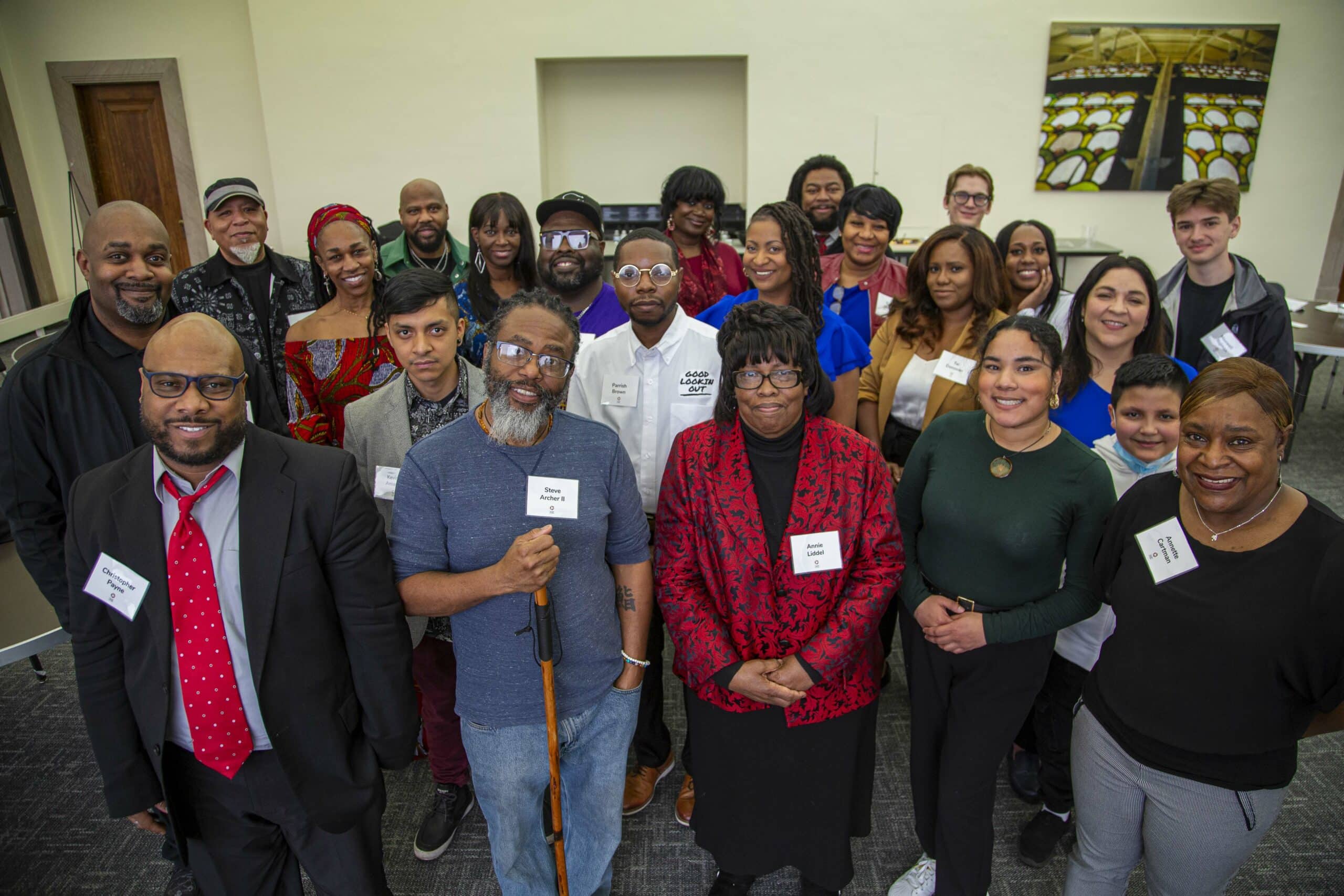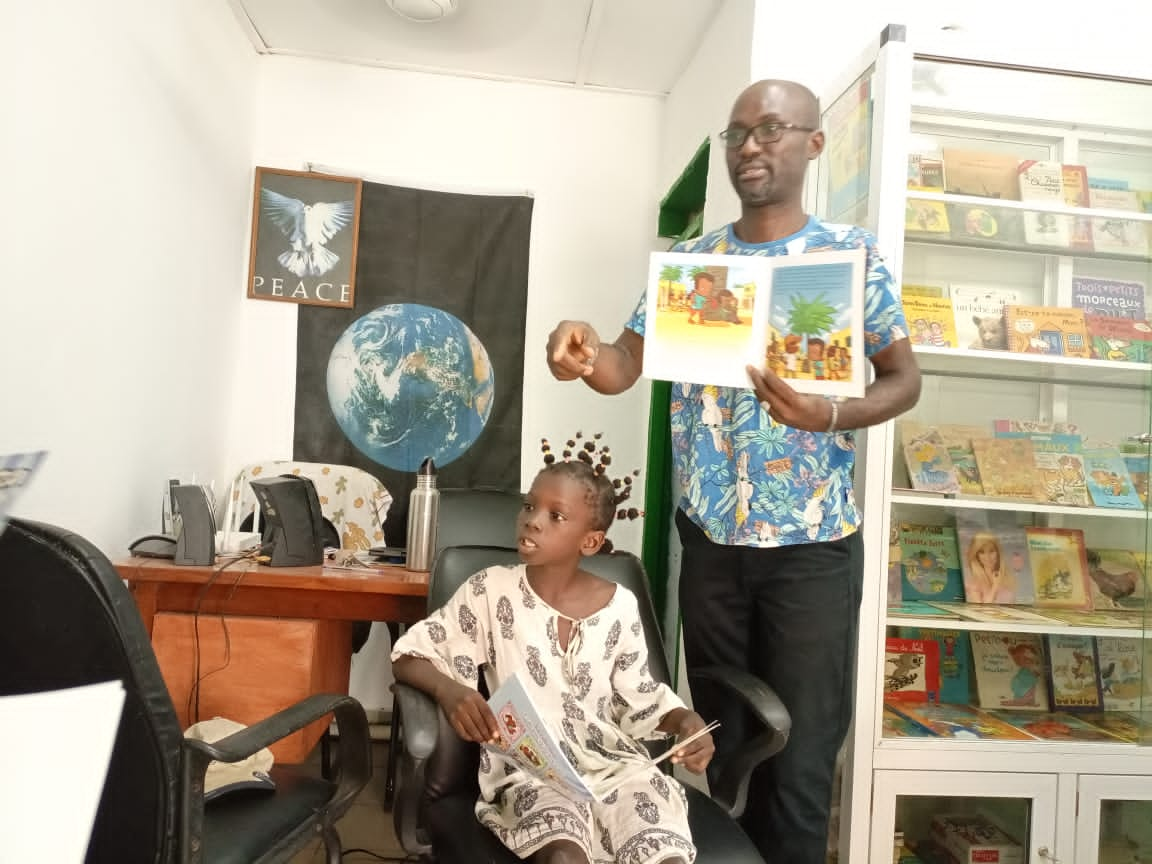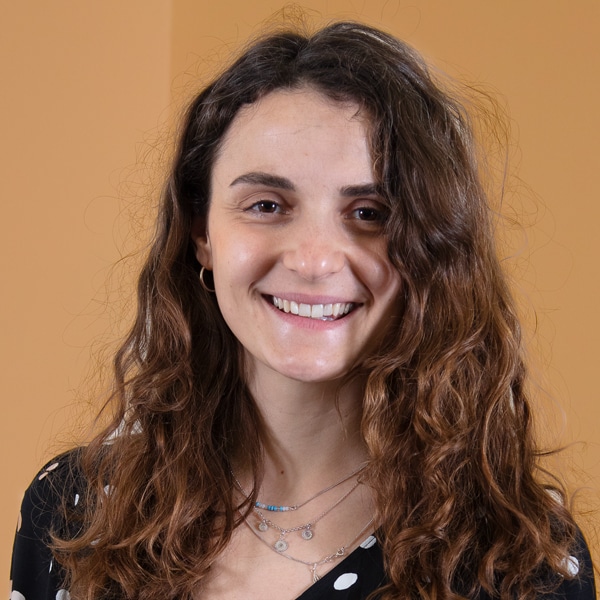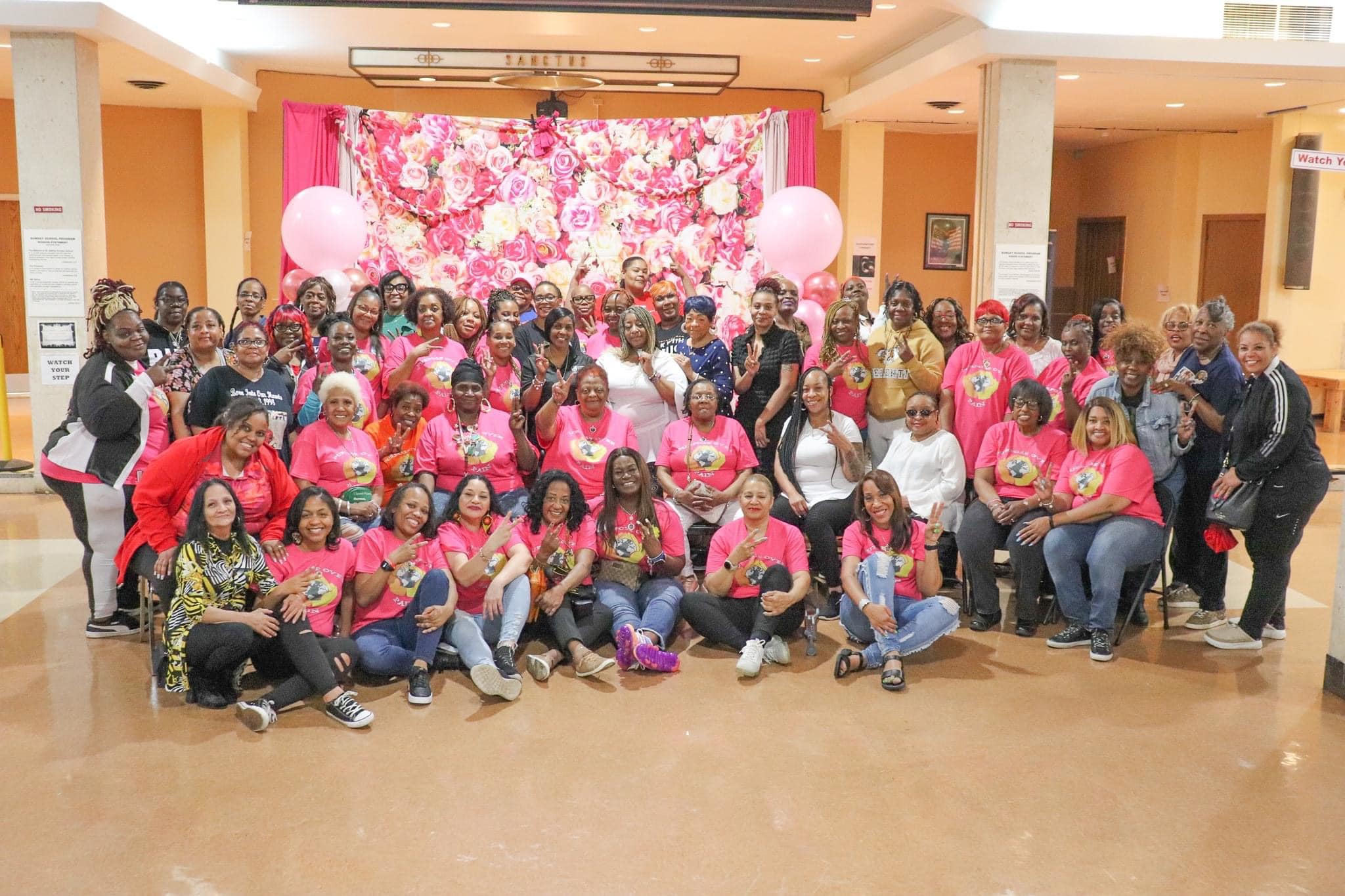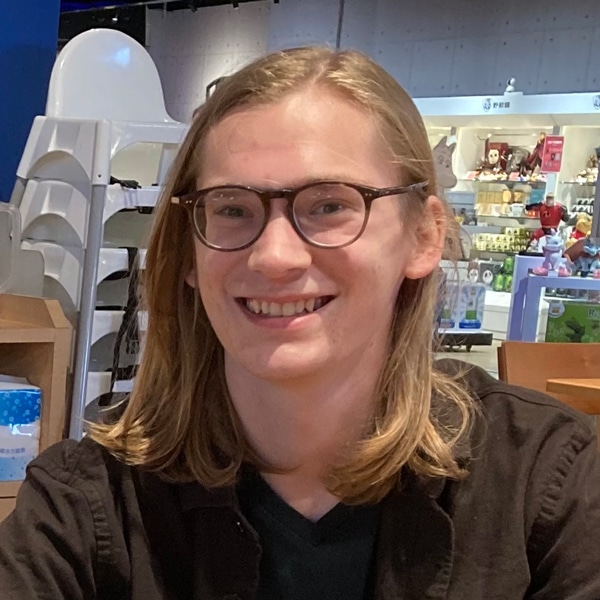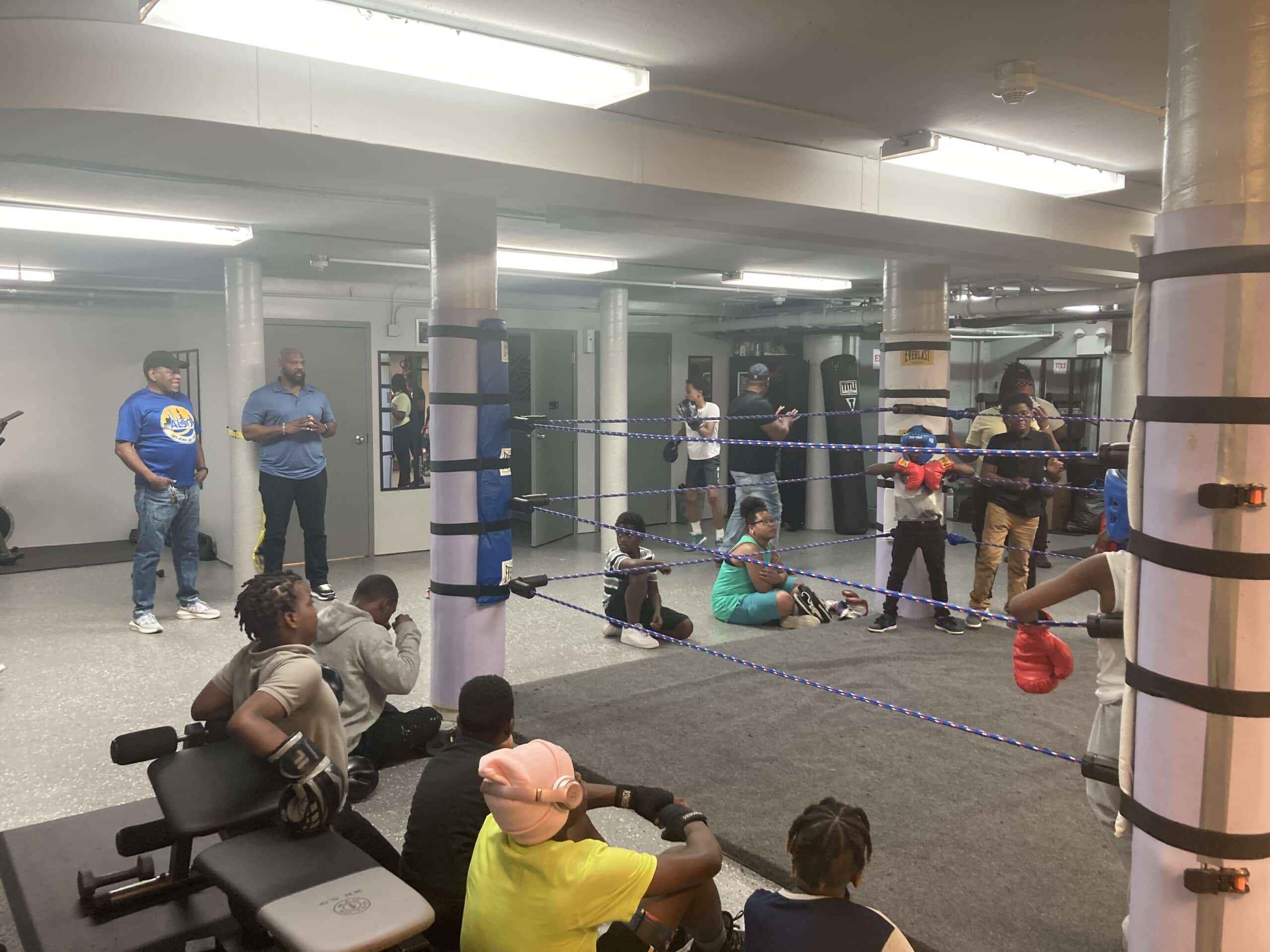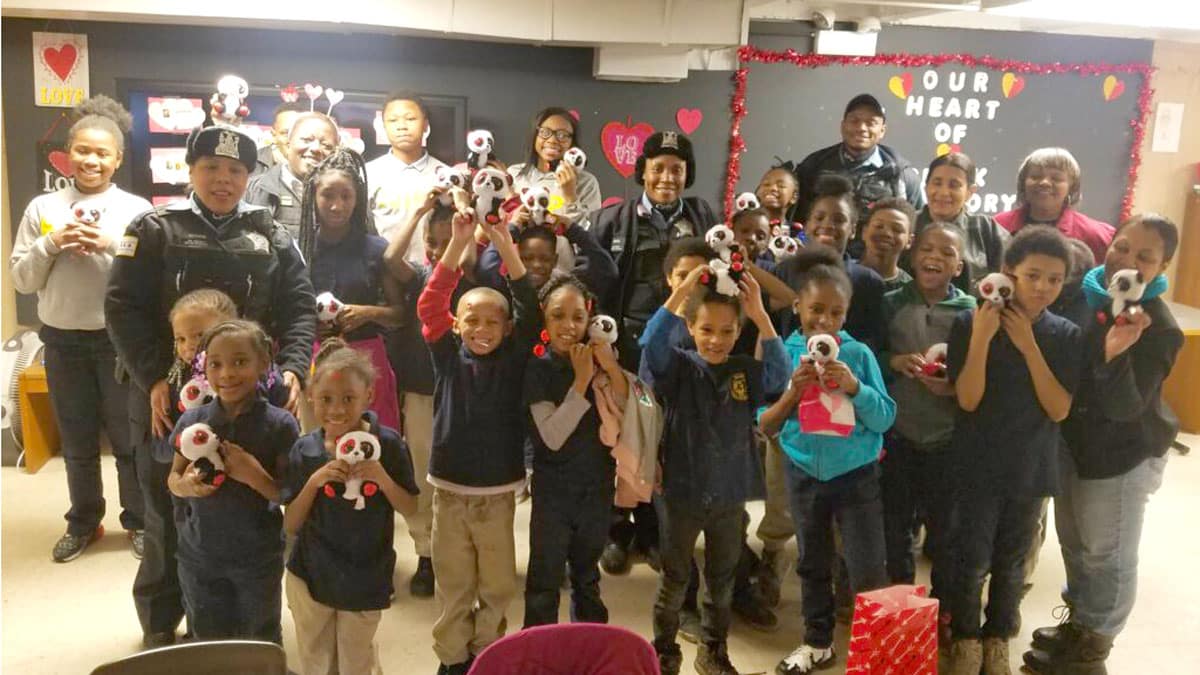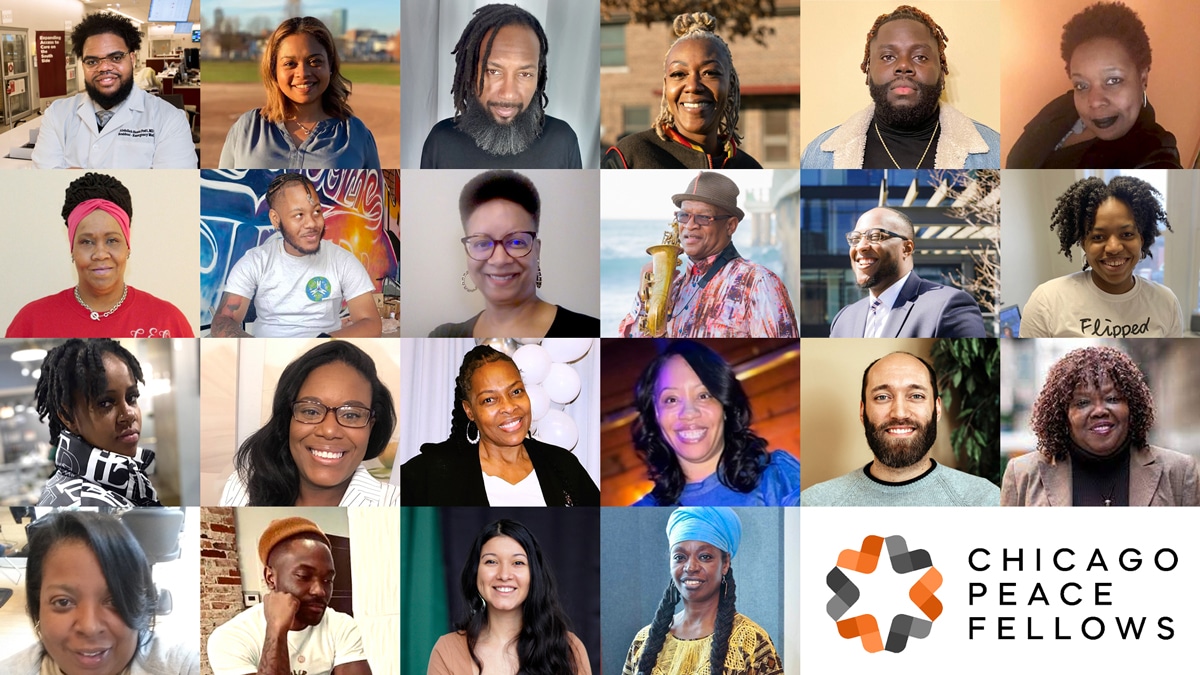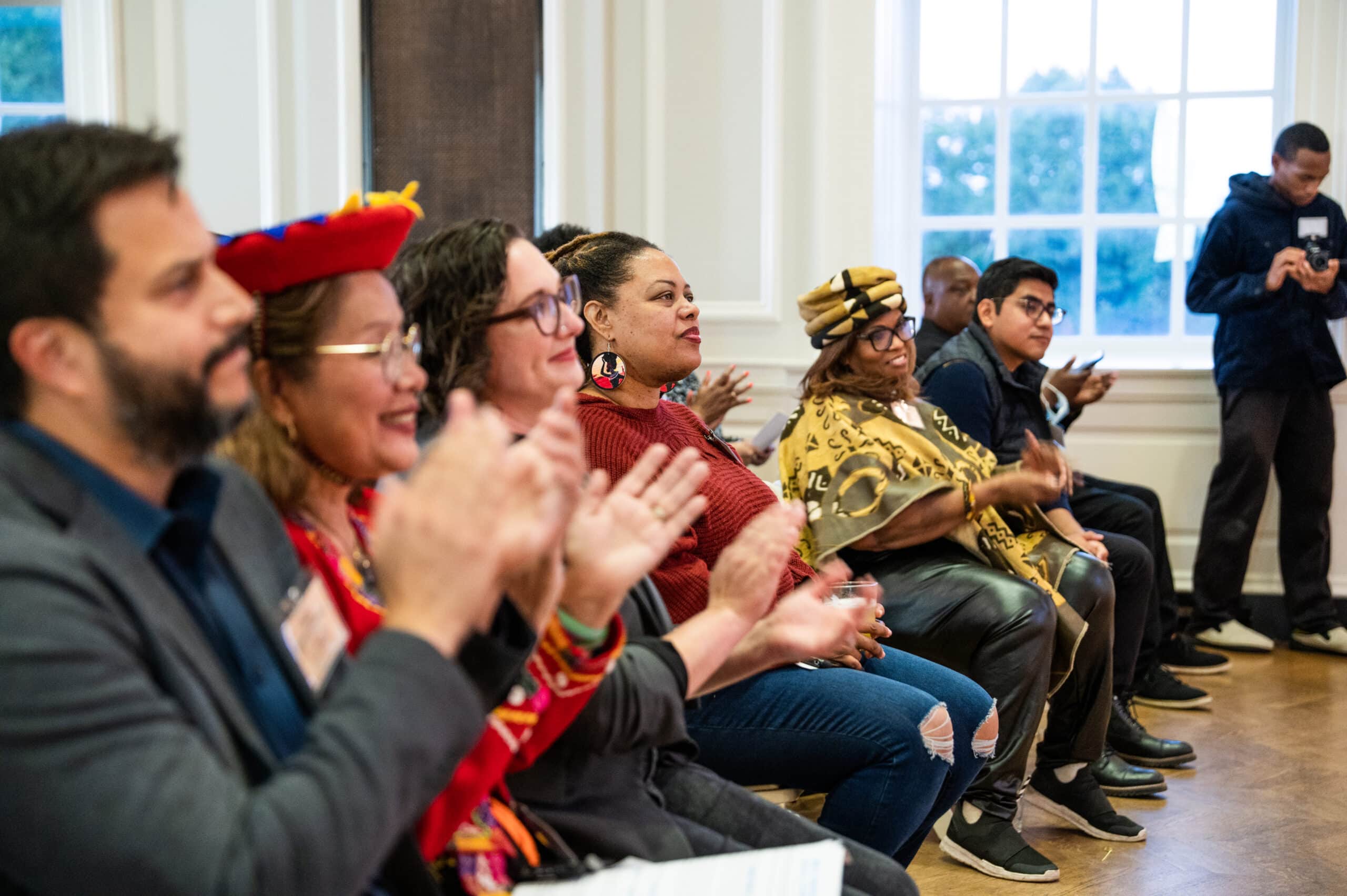Meet the 2024 Chicago Peace Fellows
The Goldin Institute invites you to learn about each of our 2024 Chicago Peace Fellows representing 14 community areas across the city. Founded in 2019 in collaboration with the Partnership for Safe and Peaceful Communities, the Chicago Peace Fellows program is the only leadership development program that is built by and for grassroots community leaders on the South and West sides of Chicago.
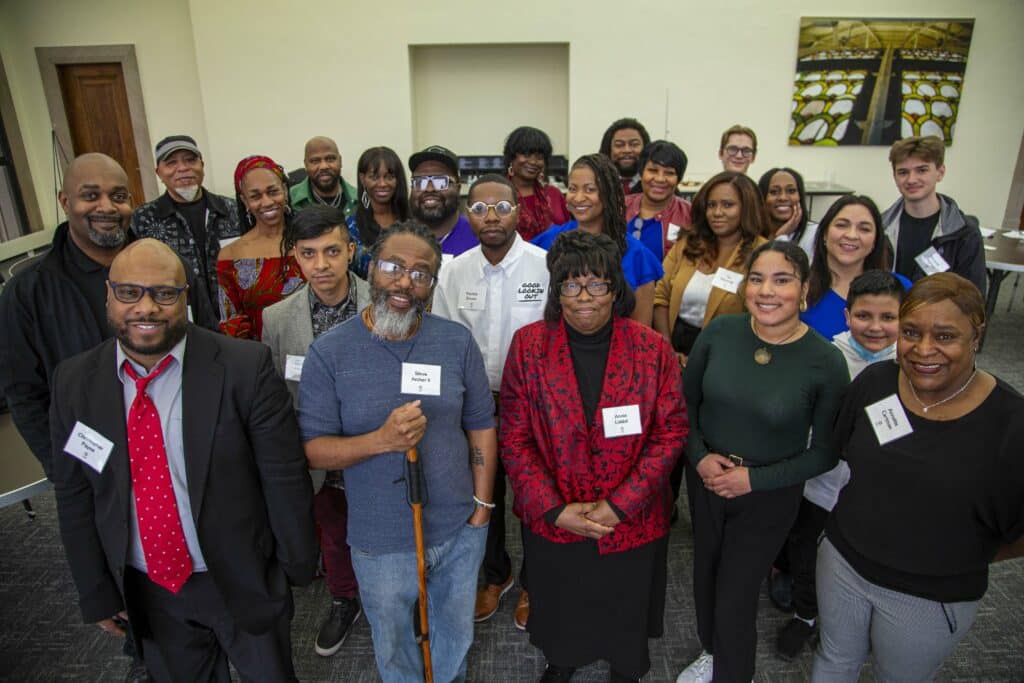
ABOUT GATHER
Peace Fellows participate in GATHER, an online asset-based community engagement course, as well as in-person training, collaborative action projects, and networking experiences with civic leaders, academic researchers, and policy makers. The Chicago Peace Fellows reduce violence by building relationships, engaging youth, collaborative peace building projects over the summer and by creating new networks among residents, families, schools, and nonprofit organizations.
The Fellows are learning together through GATHER, which is both a mobile platform for shared learning and a curriculum for people who want to build on the talents of their neighbors and the assets of their communities to make real and lasting change. Gather Fellows learn and work together through an innovative curriculum that comes pre-loaded on a tablet device with all the connectivity, materials, videos, practices and tools necessary to provide a mobile classroom and toolkit for community leadership.
The Chicago Peace Fellows project connects and equips cohorts of past grantees of the Chicago Fund for Safe and Peaceful Communities to reduce violence and promote peace. The 2024 Chicago Peace Fellows is the sixth all-Chicago cohort to utilize the GATHER platform, an online learning hub built by the Goldin Institute to empower grassroots leaders.
The Chicago Peace Fellows will engage in a 30-week course of intensive shared learning as well as group projects, culminating in a graduation event in November, 2024. The curriculum has been designed in collaboration with the grantees themselves, based on their practical knowledge and hard earned wisdom, with input from a wide range of civic leaders. Fellows will reflect on their past summer work, identify successes and lessons learned, and improve their abilities by sharing strengths and learning new skills.
The Goldin Institute and the Partnership for Safe and Peaceful Communities have aligned missions that value authentic community leadership. The Chicago Fund is uniquely effective at finding motivated problem-solvers and community-builders. By connecting Chicago leaders through GATHER, their efforts to nurture safer and more peaceful communities will be more effective, interconnected and lasting.
OUR PARTNERS
A special thanks to the Chicago Community Trust, the Conant Family Foundation, the Frankel Family Foundation, the MacArthur Foundation, the Polk Bros. Foundation, the Racial Justice Pooled Fund, the Seabury Family Foundation, and the Partnership for Safe and Peaceful Communities for making this program possible.
To follow along the learning journey with the Chicago Peace Fellows, please sign up for our newsletter and follow up on Twitter, Facebook and Instagram.
Transforming a Barbershop into a Children's Library
One day recently, James Offuh, 2022 Goldin Global Fellow and Founder of United for Peace Against Conflicts International (UFPACI) from Côte d’Ivoire, saw kids playing with his barber tools. Realizing the hazards here, he instead offered them some books as an alternative which saw the creation of his Peace Library Project.
This seemingly random moment created a positive change for the kids in his community, highlighting how we can play our part in creating social change by leveraging the resources we already have. As a result, James, a peace advocate and educator, initiated the Children Transformative Literacy Peace Library Project and contributed to a visioning summit by launching a parenting toolkit in his community.
In this piece, he speaks more about this initiative’s impact on the children and their families, the challenges faced, and the driving inspiration behind this transformative work.
A Library Provides a Safe Space for Children
Before the creation of the peace library, which is entirely free to use, James states that children loitered on the streets, playing harmfully like throwing stones at each other, interacting with abuses like rudeness and arrogance, showing hateful sentiments, and being apathetic to one another.
“In contrast, now major outcomes are that children around my community have found a safe space for learning virtues, values that support good moral behaviors.” he says. Further, he believes – through such initiatives – children are more likely to be exposed to peace, justice, social cohesion, and accountability values “Most importantly children are developing interest in books, learning to read and always visiting the book station as a place of socialization.”
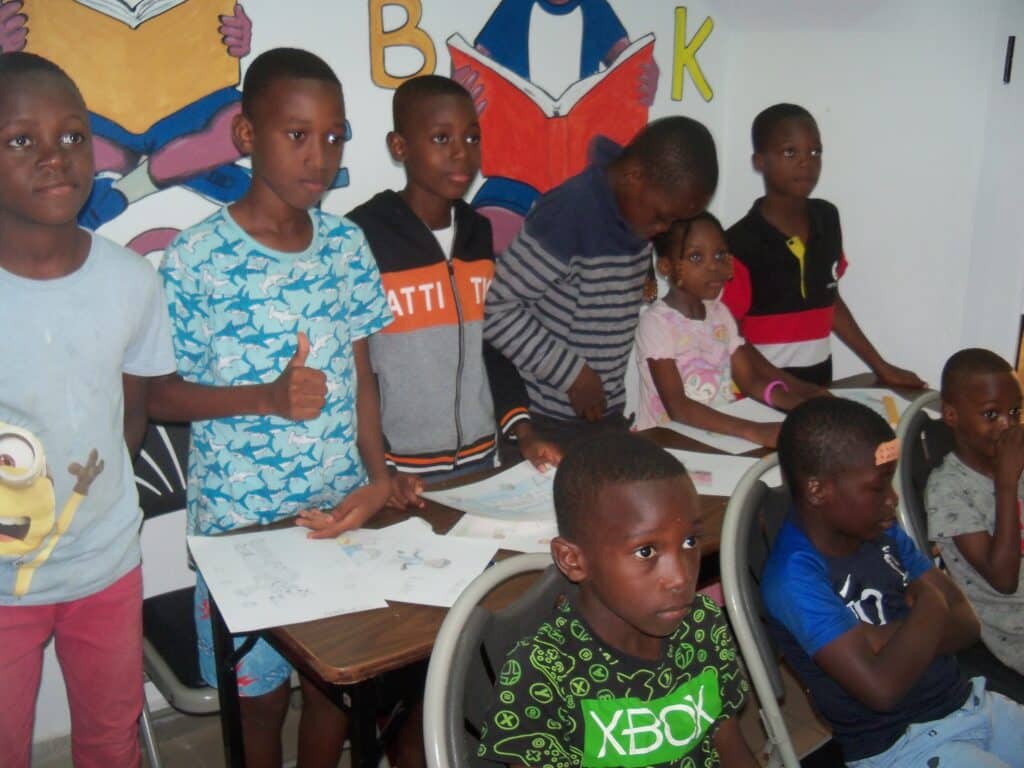
He highlights the role of the ‘Assets Based Community Development’ approach by valuing it as a critical principle to uncover gifts within our community, focusing on what’s “strong” rather than what’s “wrong”.
“When planning a community-driven social change mechanism and action frameworks, such as transforming my barbershop into a community peace library to address early child illiteracy and juvenile crimes, one should pay more attention to the gifts as opposed to deficits in society.”
— James Offuh
James remarks that many children do not have the necessary parenting guidance or resources, which often leads to children and teens getting involved in criminal activities, hard drug deals, and the consumption of marijuana.
This often meant they were sent into juvenile crimes that became alarming in the Abobo town in Abidjan City. James gives a perspective on how this alternative education space outweighs some traditional ways to solve this social problem.
“I discovered that these children, most of them grew up on the streets, had no good moral education background, applying punitive, coercive measures will not solve the problem holistically, as police keep making arrests, imprisonments, etc.“
— James Offuh
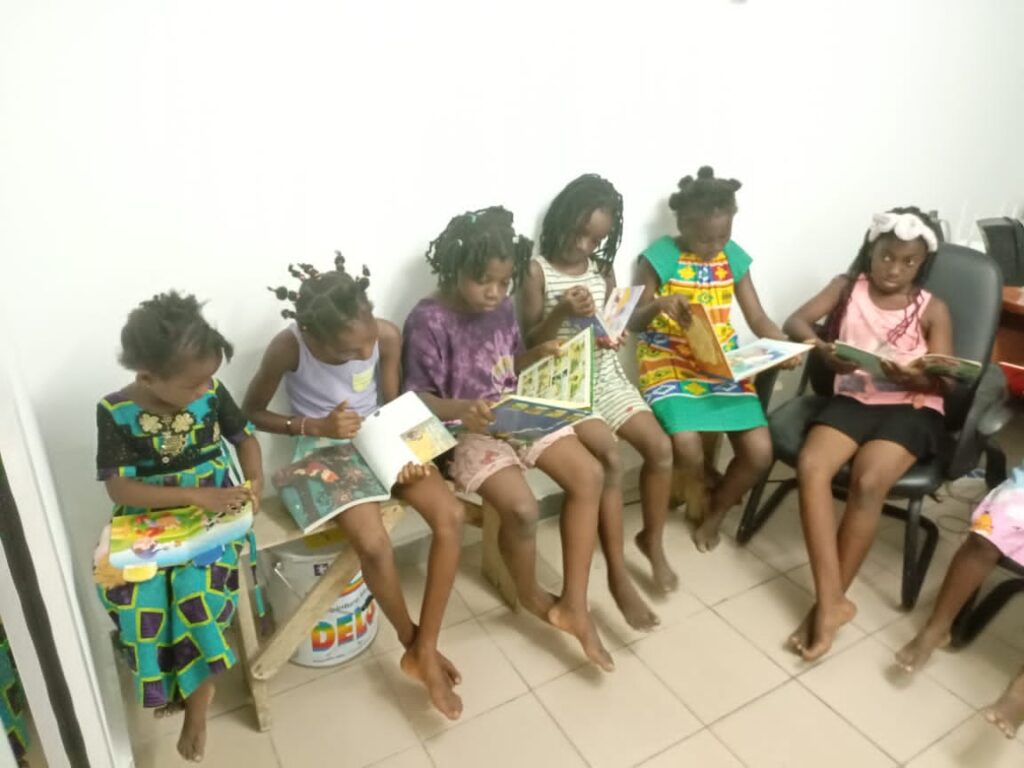
Transformational Peace through Asset Based Community Development
Further, James speaks on how, in his everyday work at the UFPACI, he implements the knowledge gained during his time as a Goldin Global Fellow: “Goldin Institute’s Gather program was an eye-opener to me; before the program, I did not know about the terms ‘ABCD’ approach and Community Driven Social Change action.” Moreover, he recalls how adaptive leadership versus technical leadership helped him understand more conflict sensitivity, analysis, and ‘do no harm’ as a tool for diagnosis over individualistic versus relational context.
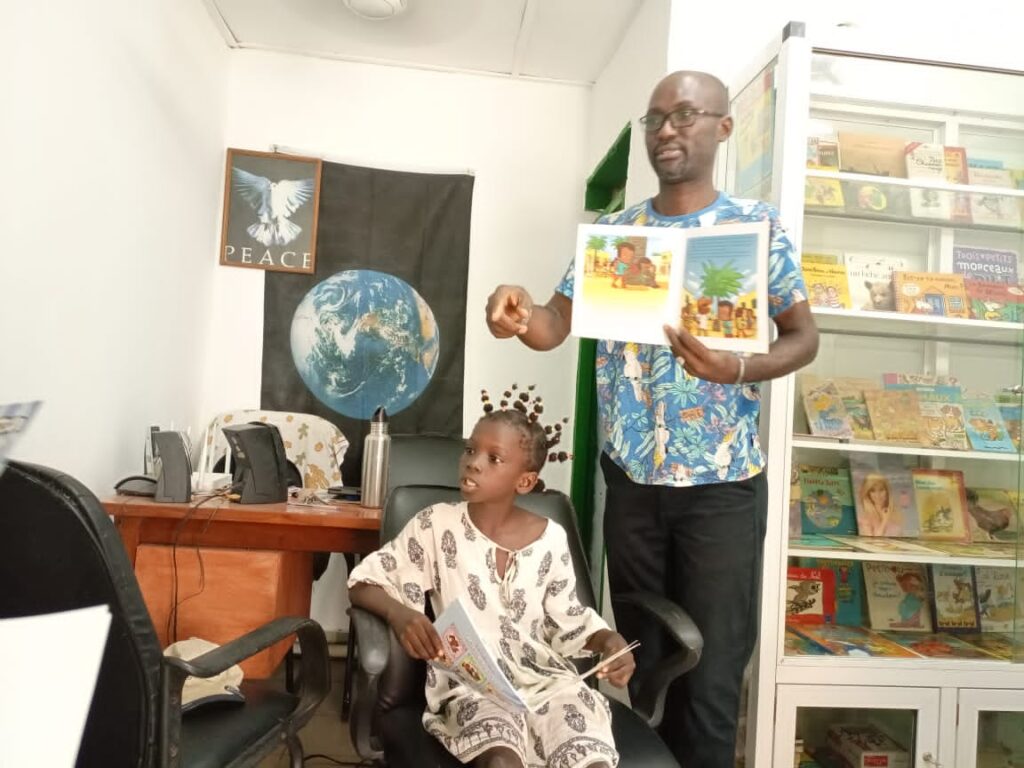
Goldin Institute expanded his global connections, too. “The Gather program expanded my networking, and I got a partner from the U.S.A. who visited me here in Cote d’Ivoire and got my details from the Goldin Institute website. He is also a member of the Gather Global Alumni network.” James also gained free online training workshops, participating recently in Project Management and Strategic Planning, which helped him learn how to design, plan, implement, monitor, and evaluate processes and outcomes.
Conclusively, James leaves us with a saying from Fredrick Douglas:
“It’s easier to build strong children than to repair broken adults.”
With his tireless work and activism at UFPACI, James and his team promote social dialogue, a non-violent culture, and peace reinforcement. Read more about their work and find ways to support them by checking their website: https://ufpacidialogue.net/. You will support the library’s longevity and sustainability so it can serve as many children for as long as possible.
Currently, the library needs infrastructural support like stable internet connectivity, electricity, comfortable reading seats and tables, workshop toolkits like drawing materials, and story books in English and French language.
A New Resource for Victims of Gun Violence
A new resource for families of victims of gun violence was recently released by 2020 Chicago Peace Fellow, Pamela Montgomery-Bosely. Her organization, Purpose Over Pain, launched a 24-hour crisis response hotline for people coping with the loss of a loved one from violence. The hotline is active from 7pm on Friday to 7pm on Sunday and can be reached by dialing 872-3CRISIS or (872) 327-4747.
Providing Crisis Support for Victims of Gun Violence
Since its inception in 2007, Purpose Over Pain has expanded from a small non-profit run by parents of victims of gun violence to an organization with full-time staff that work Monday through Friday. The organization provides positive development activities for children and youth, advocates for and promotes safer communities, and strengthens families by providing crisis support to parents or guardians whose children have been victimized. Most of Purpose Over Pain’s services are provided on weekdays, which up until now has left a gap in the services provided to families of victims of gun violence over the weekend.
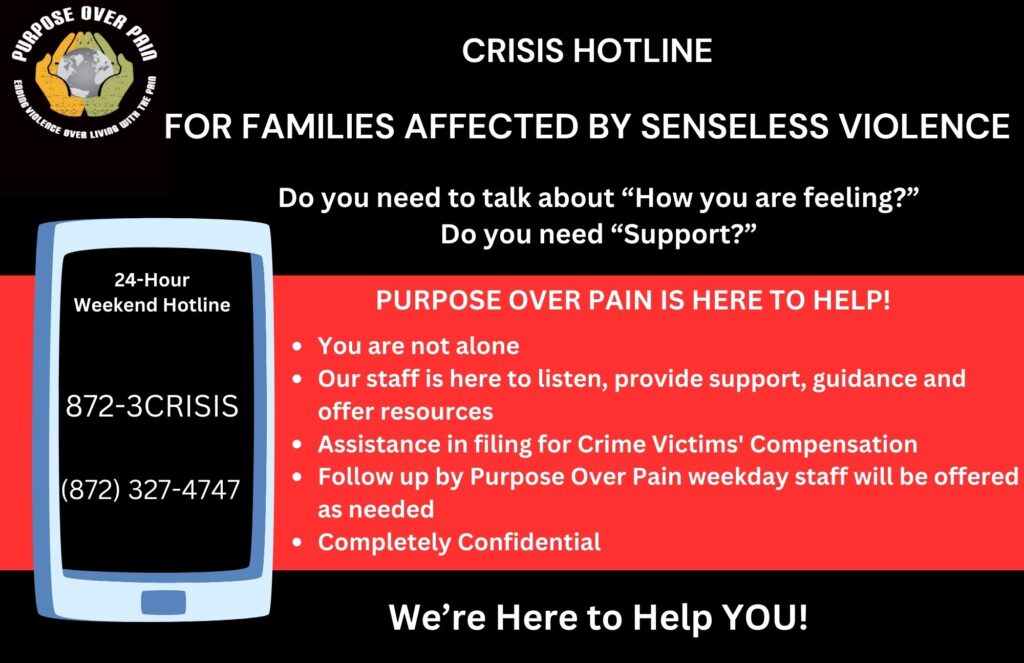
The crisis response hotline is intended to serve families at any point during the weekend, which is when the number of incidents tends to peak. Prior to opening the hotline, Purpose Over Pain would receive messages and calls throughout the weekend from people needing support after friends or family members had been shot. Pam explains: “Over the weekend, people struggle, because that's when the violence is extremely high. So, while we are available Monday through Friday, I wanted to be available on the weekends, but not my full time staff since they are survivors too.”
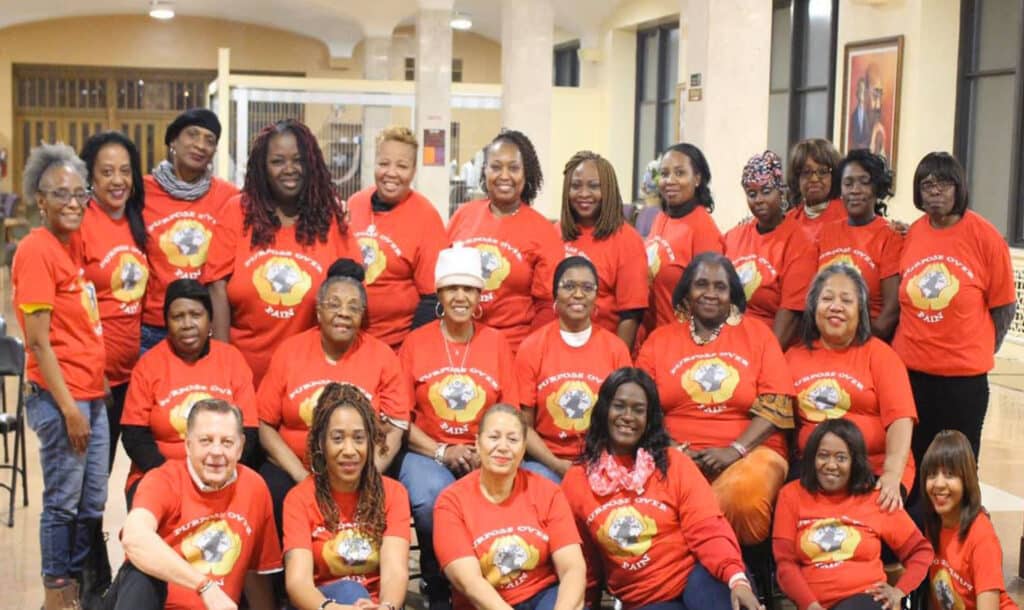
Purpose Over Pain hired four operators to work the gun violence prevention hotline over the weekend, so that Purpose Over Pain’s existing staff would not be overburdened. All of the operators have first hand experience with gun violence, having lost either children or relatives, and are trained to listen to and provide guidance to people dealing with a tragic loss. Pam describes the role of the responders:
We want to be there to support people and let them know that they’re not alone. Our staff is there to listen. Many parents have their children shot and killed in the middle of the night and might receive a call at 2 in the morning with the news. You can’t sleep after news like that, so we wanted to make sure that there is someone there to listen to them, to provide support, to provide guidance, and to provide resources.
Pam also works on the hotline covering for the other responders in case they are unavailable or if it is the anniversary date of their loved one being murdered.
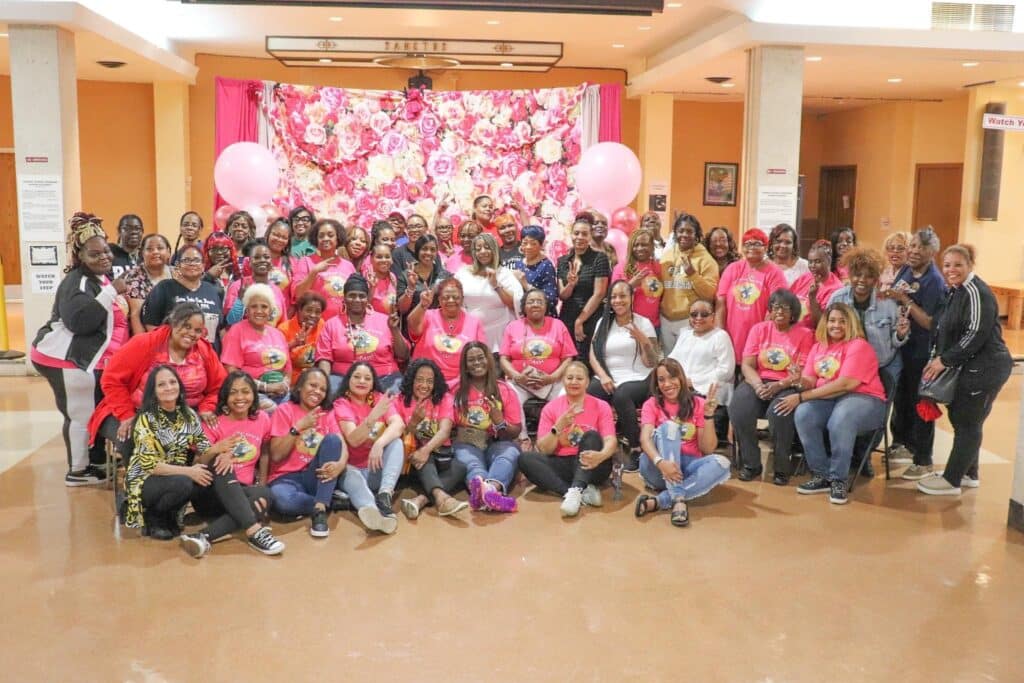
Resources Shared on the Hotline
Resources that the operators can link victims include support circles, counseling, financial resources, and job programs. Purpose Over Pain offers memorial services, support days, and mentoring sessions as part of its regular programming. Hotline operators can also link victims to outside resources. For instance, hotline operators often help victims fill out a Crime Victim Compensation Form. This form is part of the Illinois Attorney General’s Crime Victims Compensation Program which is intended to reduce the financial burden imposed on victims of violent crime and their families by providing up to $45,000 for expenses incurred by eligible victims as a result of a violent crime. Purpose Over Pain also has a full resource book that can link victims to programs that provide housing, food, clothes, and jobs. They network with other organizations, such as St. Sabina’s, so that they can connect victims with resources close to them and that are relevant to their needs.
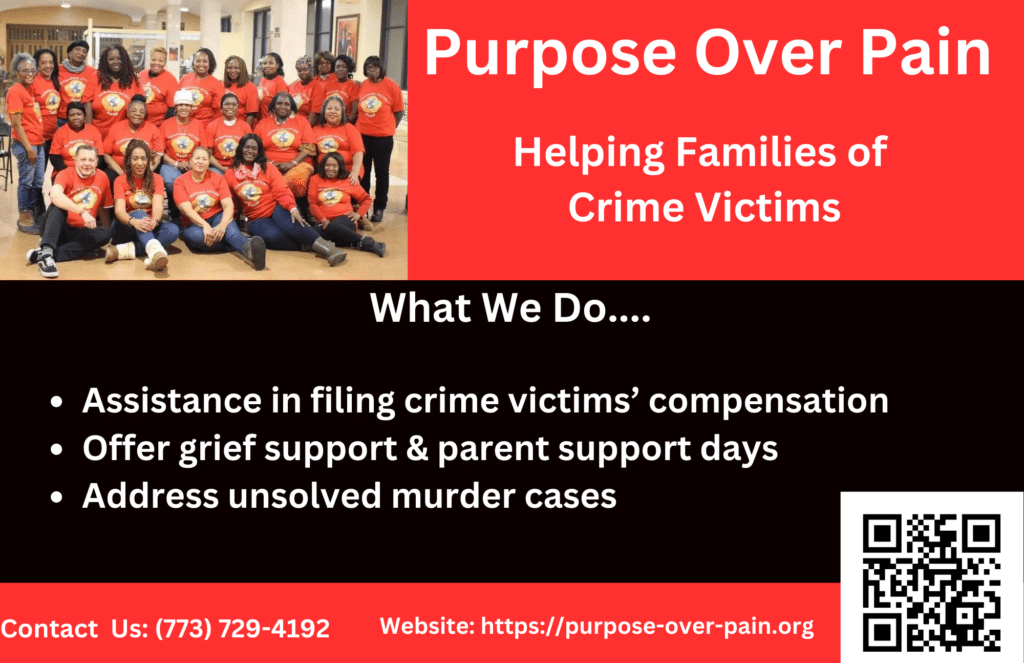
Purpose Over Pain’s hotline is the first of its kind in Chicago, previously there was no 24-hour crisis hotline for the friends and families of victims of gun violence. Now, victims can be supported by community members that have lived through similar experiences. Pam emphasizes, “When you call and they pick up the phone you’ll have a survivor, someone who understands what you’re going through. It’s not like you’re getting an automated message, you’re getting a live voice. I don’t want people to think they’re alone because they’re not, we’re here for them.” The Purpose Over Pain hotline has been created by community members for community members and will continue to provide pertinent and needed care.
West Garfield Park Boxing Club is a Haven for Youth
Brothers Tony and Sylvester Raggs recently started a youth boxing club in West Garfield Park. The club, Boxing Off the Block, is intended to teach young people from ages 13-18 discipline and the skill set of boxing. The club is located in Bethel Lutheran Church & School, and training is held on weekdays from 4pm-8pm. It is the Raggs brothers’ goal to encourage good habits in young people through the club and provide a space in which they can feel safe and have positive role models in an area where gun violence is a serious problem.
A Boxing Club that Provides a Safe Space for Youth
Boxing Off the Block serves as a haven for families in and around West Garfield Park. Tony, a 2021 Chicago Peace Fellow, has worked in violence prevention since 1981 and has served as a volunteer street outreach worker in West Garfield Park and West Humboldt Park. He and his brother Sylvester have worked alongside one another on projects working with youths and adults dealing with issues of violence and community outreach. They have used music and entertainment as a way to build community, with boxing later becoming an addition to that work. Over the course of the last two years they have found funding, trainers, and a space for their youth boxing club. They have been holding the club in Bethel Lutheran Church since October of 2022. Though the club is intended for teens aged 13-18, mothers and younger children also come to workout, box, and watch the teens spar.
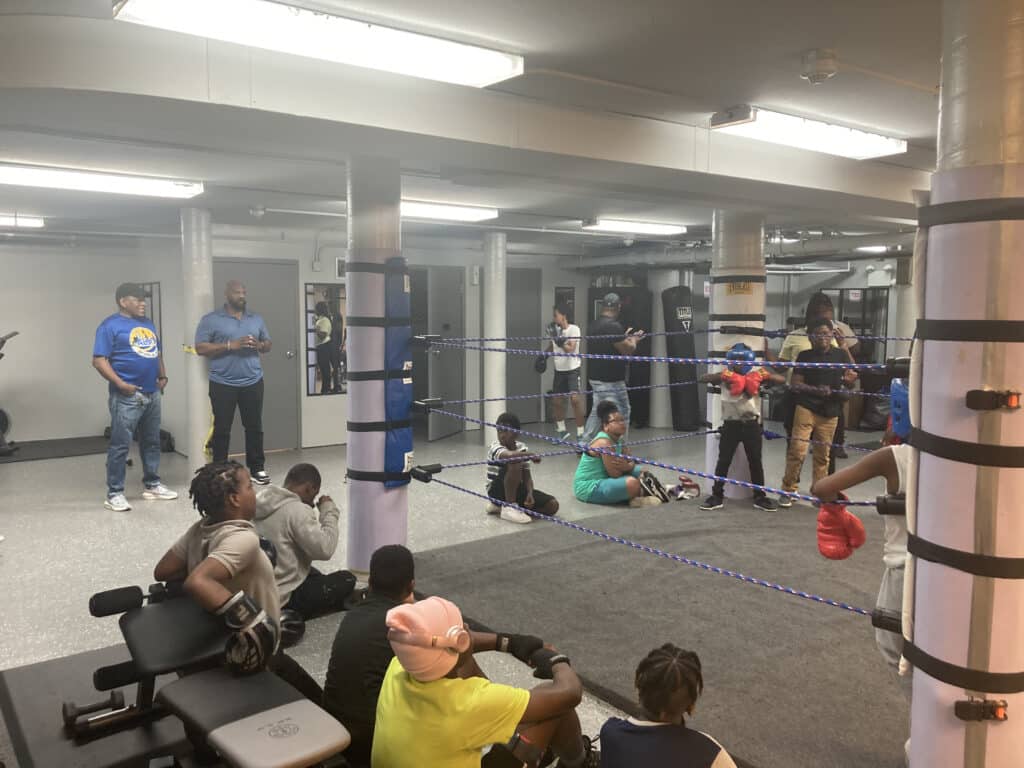
The club is stocked with workout equipment and trainers that provide the necessary tools for young people to learn boxing. The space includes a 10’x10’ ring that the brothers built themselves, punching bags, weights, and stationary bikes. They have hired two boxing coaches as well as a conditioning coach to train the young people who attend and they provide dinner for them as well. Activities are split between two groups with ages 13-15 training from 4pm - 6pm and ages 16-18 training from 6pm - 8 pm. Each group has around 15-20 young people attend.
Coaches Provide Mentorship and Structure
The coaches at Boxing Off the Block are often teens’ first mentors in boxing, providing them with training regimes and encouraging them to keep up their routines. The strength and conditioning coach, Travis Whittington, mentioned that he uses the discipline of training as a way to encourage good behavior in the gym, “when kids act out I ask them to do push-ups or run a lap so that they know what we’re here to do.” Travis provides personal coaching for the teens, giving them regimens to do outside of the gym. This is often teens’ first structured workout regime, so it provides them with a structure for building a habit of exercising.
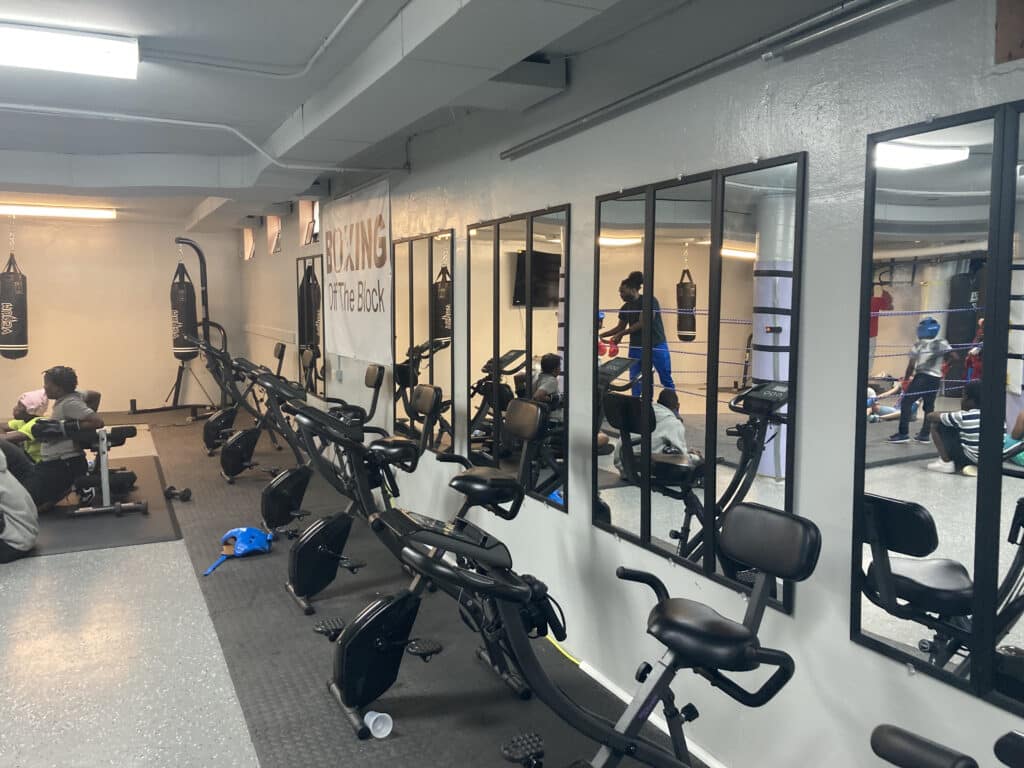
The two boxing coaches, Shawn Boyd and Levelle Whittington, emphasize the technique of boxing and its demands for control of the emotions. Shawn stresses that boxing acts as a form of stress relief and that a cool head is required to win rounds in the ring. He noted that the young people he sees excel at boxing are those who “are able to keep up a technique in a fight rather than resorting to street fighting.” Part of their hope in encouraging this kind of mindset in the youth through boxing is to help them deal with the possible threat of violence on the streets. They hope that by practicing the skill of emotional regulation in the ring, teens will be able to keep calm when confronted on the streets to know when they should back away or practice restraint.
Coach Levelle Whittington sees himself and the other boxing coaches as positive role models for the young people. He noted that many of the young people who attend the club have lost family members to gun violence and lack guidance. Boxing coaches can provide some direction and guidance by teaching the value of discipline, technique, and emotional regulation. Levelle also noted that boxing has the potential to distract from other more dangerous behaviors because it is something that can be framed as cool. Being cool allows boxing to compete with other interests, such as drugs or guns, and channels that energy into a positive direction.
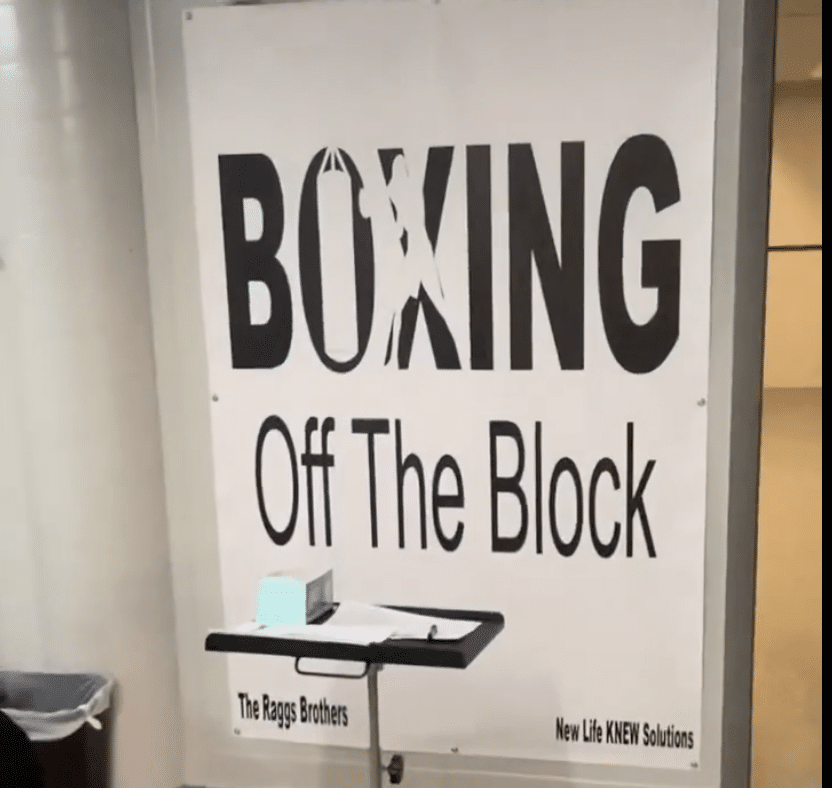
Boxing is not the only thing taught at Boxing off the Block, with a community of trainers, coaches, and students teaching the value of cooperation, self-control, and the study of technique. The club is quickly growing, with members from outside of West Garfield park also joining to learn the skill of boxing. It is the Raggs Brothers’ hope that the club will continue to gain both resources and members so that they can build community and encourage positive values in young people on the West Side.
Spark Center: A New Community Resource Center for South Side Chicago
The community of South Side Chicago will soon have a new center serving them: Spark Center, thanks to the tireless contribution of Jennifer Maddox, Executive Director of Future Ties and 2020 Chicago Peace Fellow. Spark Center will hopefully open in 2024, at 6330 S. King Drive, and provide much-needed opportunities for residents in West Woodlawn, including social services and other engagement activities.
Jennifer says the Spark Center name itself will hopefully spark others to see that people need resources, accessibility to programming, and community engagement "in an area that was really one of the worst blocks of the city of Chicago."
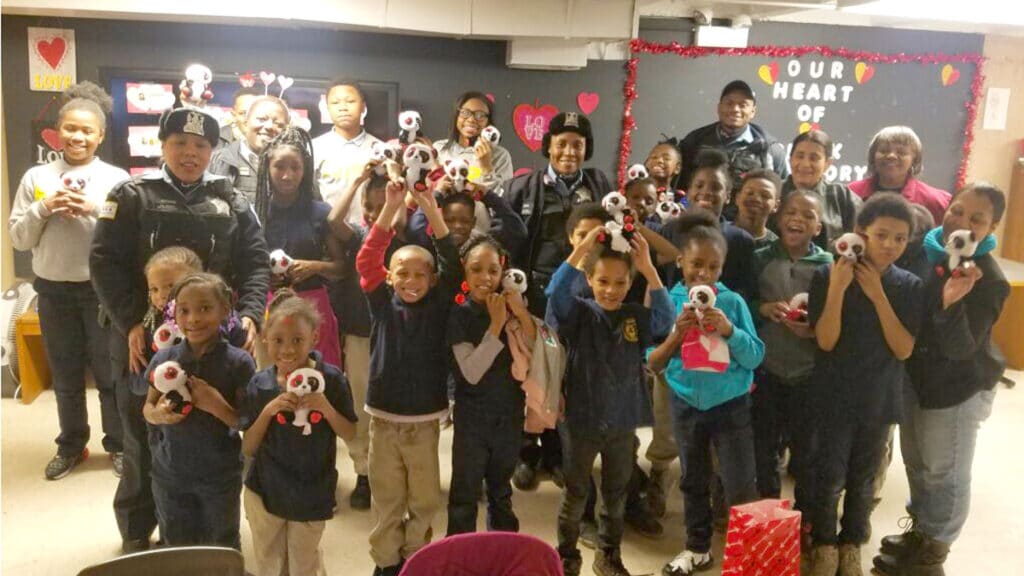
This is why Jennifer decided to establish the center, to attend to the community's vital needs and strengthen ties among young people and families in the area. The Spark Center will offer a range of programs, such as after-school clubs, workshops, assistance for parents, and a year-long program to build young people's capacity to engage in employment opportunities.
Broadening the Positive Impact on Community
The community has benefited from the work of Future Ties throughout the years, and things are only going to get better whereby they will touch even more lives with this center.
“In 2021, we got a donation from BODi to purchase a Walgreens building. Purchasing this building means we can expand our programming which is currently being offered in a basement, which means we are limited in what we can provide. Our new space will allow us to triple our programming. In the basement, we have to be very selective because we don't have a lot of space." --- Jennifer Maddox
Now, with more space and opportunities, she explains how the narrative can be rewritten for good.
"We want to change the narrative about the community because what we see happening over there is a lot of trauma, crime, disorder, and chaos. We want to alter that to show that families within communities are trying to be successful. Still, they need help and support."
Although they are still in the zoning process, she gives us a sneak peek of what families and youth can expect from a day spent in Spark Center.
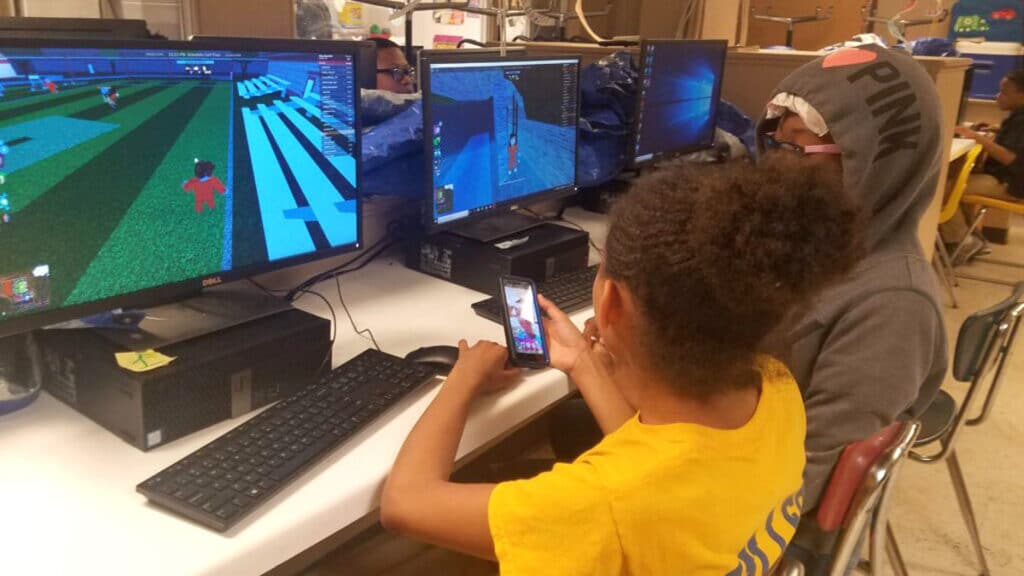
"Some of the programs that we offer are after-school programs. Typically, the neighborhood schools offer after-school programming, but they have over 700 students, so their capacities are limited. We get referrals from the schools and then do our community outreach to provide an after-school program. We offer an evening meal when they come in; they get a snack, they get help with their homework, if they have any issues with reading or something, we talk to their parents and see how we can help them."
Young people will also have a year-long program through which they can benefit.
"Here, we are building young people's capacities for employment opportunities. We provide training for resume building, interview skills, elevator teaching, and some soft skills they need to be job ready."
Speaking about the versatility of this center, Jennifer also elaborated on their plans to open a commercial kitchen.
"Once we build up the kitchen, it will also allow small businesses and entrepreneurs to use our space to get their brand out to people. It gets the community more engaged in what we are doing and contributes to building healthy eating habits among people."
A Community-Based Space
Jennifer believes such community-based initiatives are crucial for the well-being of that community. She elaborated further on the engagement process of the community:
“We had community meetings, and community members had the chance to ask questions about the program, about the design. They also spoke about what they wanted to see in this space. We considered all that and worked with our architect to see if things are in the way the community was saying."
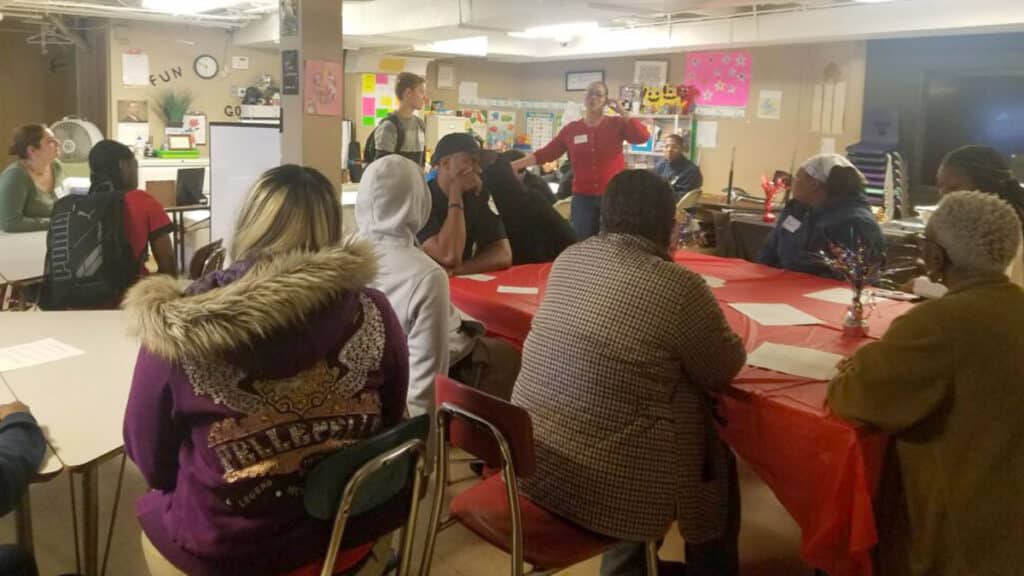
She adds that this space is for the community, and they are the ones utilizing it. She recalls that as a non-profit, they want people to see Spark Center as a place they can turn to which acknowledges them and meets their needs. For this, she understands that input from the community is vital in genuinely including and adjusting to its needs.
“We do not want a building that sits empty. We want people here. By this, we know that people in the building are using our services. We constantly wired the community. We have a flyer where people can scan a code, fill it out as a survey, and let us know what they think is working and what is not. They can also give us ideas on how they can be more engaged. We are always open to hearing new ideas.”
Building On Her Experience as a Chicago Peace Fellow
During our conversation, she touched on the importance of authentic community engagement:
"In the near future, I aim to have more parents included. We have a parent mentor program, where we work with parents and build their capacities to get them to see their best. Sometimes parents live through their children […].”
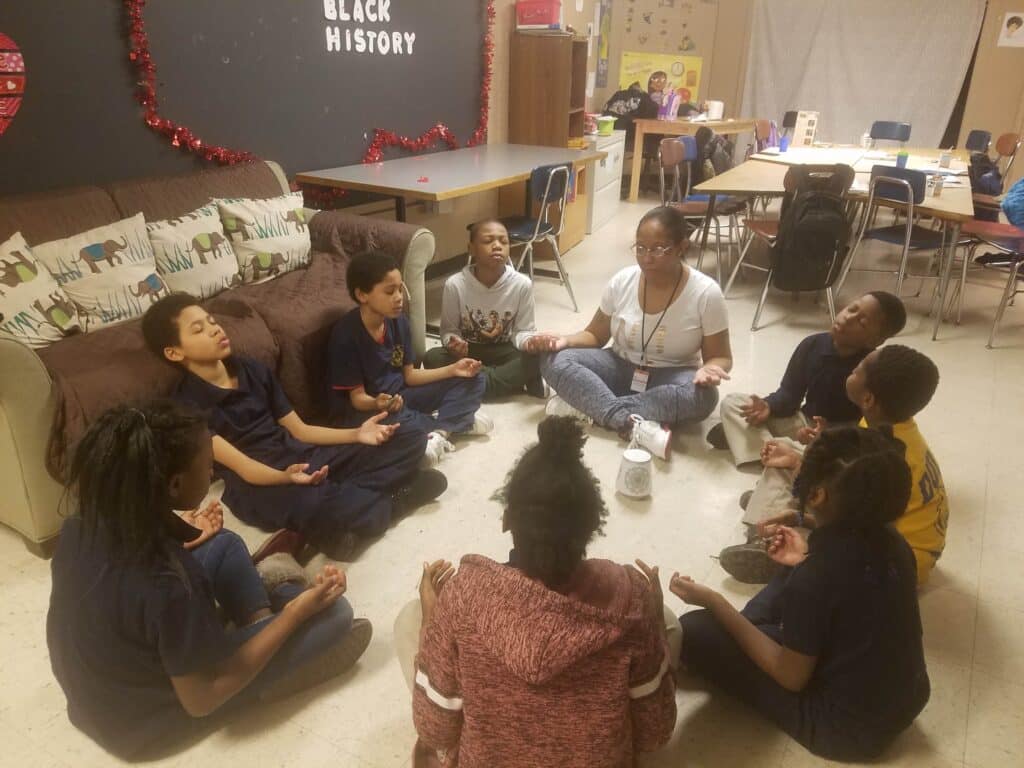
Speaking to parents, she adds "you are never too old to learn anything. We are supporting parents with their passions and things they wanted to do when they were younger."
Jennifer further explains that Spark Center has partnerships to help parents to get their high school diplomas, skills to be ready for a job, and driver’s licenses. And sometimes they also hire the parents and want them to be involved in the organization.
“Those simple things that people do not really think about are big to some of our parents, who never had someone to support them to get the things they wanted for themselves.”
When speaking about grassroots work, we could not leave aside her participation in the Chicago Peace Fellows Program in 2020.
“It was an honor to be a Peace Fellow because it made me feel I was not here alone. It made me feel that there are people across the city that were just as passionate and just as committed."
She adds that she loved listening to the other fellows' challenges and successes.
“They were so supportive of each other. It can make one have more connections; you have a whole cohort of Peace Fellows that you can call and say, ‘Do you know someone who does this or that?’ We want to know more about the work that others are doing. This is because to have peace and connectivity, we need to cooperate and spread the knowledge we have.”
Jennifer continues to implement her knowledge by dedicating herself to serving the community. As we wrapped up our interview, Jennifer shared that she is "just a woman trying to make a change in the community, coming from one service job, being a Chicago police officer for over 25 years, and now still maintaining a relationship with the community because that's the most important element to building trust."
She states the community needs change-agents that are credible and whom people trust and value.
***
If you would like to support the Spark Center’s cause, visit their website to volunteer, donate, or host your workshop.
You can also follow their work on social media:
Meet the 2023 Chicago Peace Fellows
by Travis Rejman, Executive Director
The Goldin Institute invites you to learn about each of our 2023 Chicago Peace Fellows representing 14 community areas across the city. Founded in 2019 in collaboration with the Partnership for Safe and Peaceful Communities, the Chicago Peace Fellows program is the only leadership development program that is built by and for grassroots community leaders on the South and West sides of Chicago.

ABOUT GATHER
Peace Fellows participate in GATHER, an online asset-based community engagement course, as well as in-person training, collaborative action projects, and networking experiences with civic leaders, academic researchers, and policy makers. The Chicago Peace Fellows reduce violence by building relationships, engaging youth, collaborative peace building projects over the summer and by creating new networks among residents, families, schools, and nonprofit organizations.
The Fellows are learning together through GATHER, which is both a mobile platform for shared learning and a curriculum for people who want to build on the talents of their neighbors and the assets of their communities to make real and lasting change. Gather Fellows learn and work together through an innovative curriculum that comes pre-loaded on a tablet device with all the connectivity, materials, videos, practices and tools necessary to provide a mobile classroom and toolkit for community leadership.
The Chicago Peace Fellows project connects and equips cohorts of past grantees of the Chicago Fund for Safe and Peaceful Communities to reduce violence and promote peace. The 2023 Chicago Peace Fellows is the fifth all-Chicago cohort to utilize the GATHER platform, an online learning hub built by the Goldin Institute to empower grassroots leaders.
The Chicago Peace Fellows will engage in a 22-week course of intensive shared learning as well as group projects, culminating in a graduation event in September 2022. The curriculum has been designed in collaboration with the grantees themselves, based on their practical knowledge and hard earned wisdom, with input from a wide range of civic leaders. Fellows will reflect on their past summer work, identify successes and lessons learned, and improve their abilities by sharing strengths and learning new skills.
The Goldin Institute and the Partnership for Safe and Peaceful Communities have aligned missions that value authentic community leadership. The Chicago Fund is uniquely effective at finding motivated problem-solvers and community-builders. By connecting Chicago leaders through GATHER, their efforts to nurture safer and more peaceful communities will be more effective, interconnected and lasting.
OUR PARTNERS
A special thanks to the Chicago Community Trust, the Conant Family Foundation, Crown Family Philanthropies, the Frankel Family Foundation, the MacArthur Foundation, the Polk Bros. Foundation, the Racial Justice Pooled Fund, the Seabury Family Foundation, and the Partnership for Safe and Peaceful Communities for making this program possible.
To follow along the learning journey with the Chicago Peace Fellows, please sign up for our newsletter and follow up on Twitter, Facebook and Instagram.
A Look Back on 2022: a year of growth and strengthened solidarity around the globe
By Jassi K. Sandhar, Global Research Fellow
As we wind down the end of another year, I am amazed at how much we have achieved within our network and the strides we have made, both as individuals and as a collective. Our global network and partners continue to accelerate their efforts to attend to the most urgent and pressing needs of their communities. We witnessed increased levels of solidarity, more calls for positive action, strengthened collaborations and shared leadership. We end this year with 150 alumni (representing 40 countries) who have graduated from our Fellows Program and are now part of our wider network.
We have compiled a month-by-month timeline of the achievements of our grassroots leaders below. Despite some challenging times, our network continue to respond with compassion, empathy, and commitment to social justice. We end the year by thanking our dedicated supporters whose commitment made many of this year’s successes possible. We look forward to your continued support for community-driven social change in 2023!
January
We commemorated the 12th anniversary of the Haiti earthquake (which had a devastating and lasting impact on the country), by sharing an update on the current situation and launching our “Global Solidarity with Haiti campaign” to support our partners Daniel Tillias and Malya Villard-Appolon, who are on the frontlines responding to those most in need.
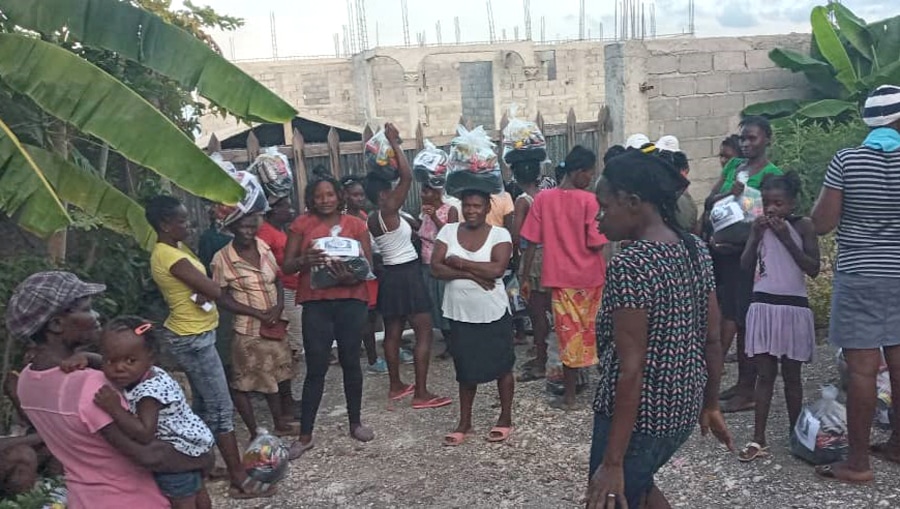
Our alumni in Liberia, Jennifer Henshaw, and her organization LEGAL which works to support the LGBT communities in the country, celebrated their 10th anniversary. Jennifer provides a reflection on their 10-year journey, including their long-standing achievements and ongoing challenges.
January was also a month of collaboration between our global partners. Our partners in the Philippines, Andy Alegre and Susana Salvador-Anayatin, joined forces to deliver urgent humanitarian relief to families following Typhoon Odette in the Philippines. Our 2021 Global Fellows Mathias Ngong Njoya (from Cameroon) and Gopal Iyer (from the UK) also collaborated to host a two-day workshop which brought together 30 youth from 15 countries in Africa and Asia. The workshop was designed to help and guide youth on professional development planning.
February
This month, our 2021 Global Fellows provided an update on their collective campaign; 24 grassroots leaders created a joint fundraising campaign to raise money to support their continued social change projects in their countries. Collectively they raised $12,000. John Kamma, 2021 Global Fellow from Liberia, used those funds to initiate a community clean-up day in Glass Factory community (which is an overpopulated but underserved community).
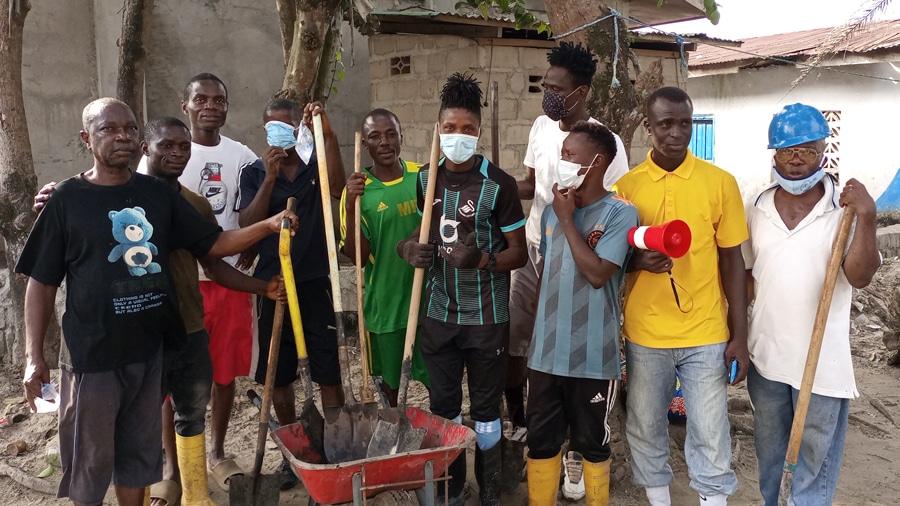
This month, the Chicago Peace Fellows Mutual Aid Collaborative also held a press conference on the anniversary of the assassination of Malcolm X to amplify the themes of their open letter, A Pathway to Anti-Racist Philanthropy.
2021 Global Fellow from The Philippines, Andy Alegre, commemorated International Day of Prayer and Awareness Against Human Trafficking by organizing an online prayer session together with churches and various organizations using a special vigil of prayer specific to this event. This month, Chicago Peace Fellow Jamila Trimuel’s organization also hosted their annual LOV Day, a day dedicated to “show love to our Black girls!”.
March
We welcomed our 2022 Chicago Peace Fellows! 14 grassroots leaders representing 14 different communities across Chicago joined the Fellows program to learn, share, and collaborate together as a Community of Practice.
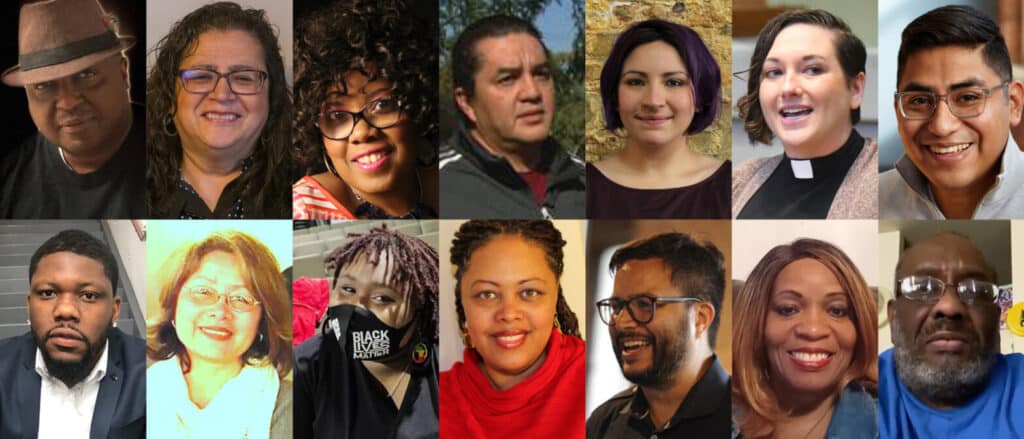
Our 2021 graduates of the Chicago Peace Fellows Program also organized and enjoyed a retreat, to collaboratively focus on rest, restoration and reflection in beautiful surroundings and to strengthen the bonds between them.
We also saw collaborations between DePaul University (Chicago) and Global Fellow Berry Behr (South Africa) which helped document oral history testimonies to capture the interfaith efforts from leaders on the front lines of ending apartheid.
April
Goldin Global Fellow Munyaradzi Dzimunwe from Zimbabwe partnered with She Trades to provide training for women entrepreneurs in the country to help them sell their products on international markets.
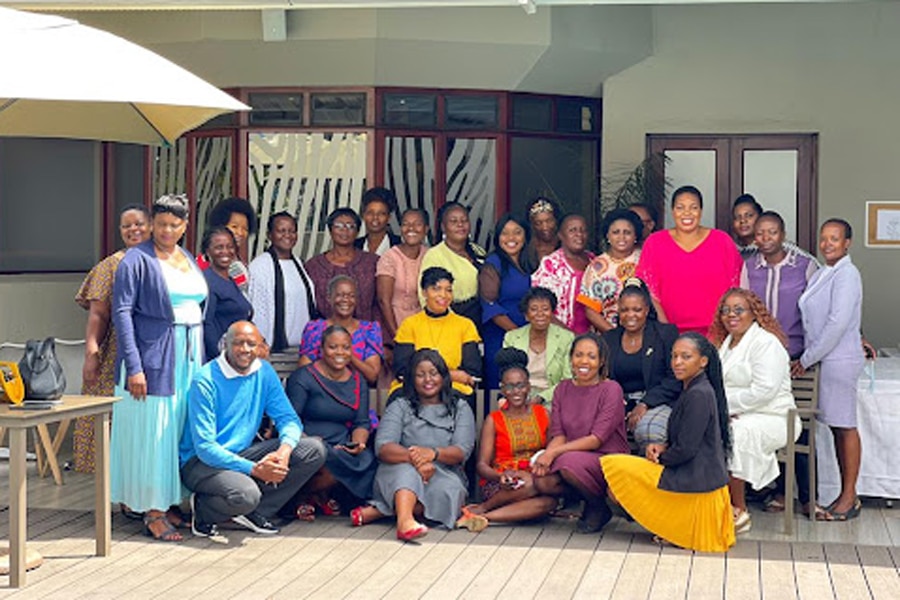
Goldin Global Fellow Nicholas Songora Odoll also provided an update on the critical work of the Manyatta Youth Entertainment (MAYE) in the coastal counties of Kenya to promote social accountability, civic education, and social justice using creative arts. Chicago Peace Fellow, Annette Kelly, also helped host a series of workshops on Violence Prevention in Chicago through her work with the Chicagoland Vaccine Partnership (CVP) in the communities hardest hit by COVID and violence.
The 2022 Chicago Peace Fellows also met for the first time to begin their Fellows Program; the launch brought together a powerful community of activists, artists, social workers, and community leaders representing 14 community areas on the South and West sides of Chicago.
May
Chicago Peace Fellows provided 300 Mother's Day bouquets to mothers who have lost their children to violence in Chicago, bringing comfort to families impacted by gun violence and raising support for peace building projects in Chicago to prevent these tragedies in the future.
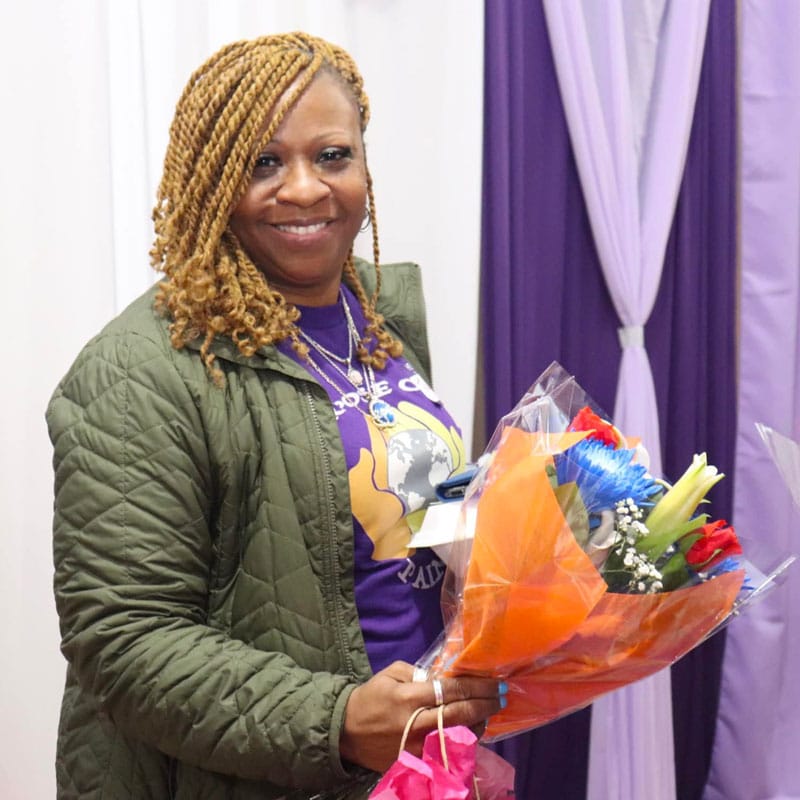
2018 Goldin Global Fellow Cynthia Luvlee shares an inspiring update from Shyne San Diego, sharing the principles that powered the exponential growth of the Shyne Survivor Business Network™ which recently enrolled its 50th survivor entrepreneur!
We also received an update from Global Fellow from Liberia, John Kamma, who worked in collaboration with Catalyst 2030 and his team to mobilize his community to improve health and sanitation and hosted a conversation on narrowing the "justice gap" in the Glass Factory neighborhood.
Mahdar Tahir, Goldin Global Fellow from Malaysia and founder of the Crescent Collective, shared his insights as a panellist for a discussion on religious freedom for which he spoke about the role of religious leaders in building social harmony.
June
In June we welcomed 14 grassroots leaders from around the world onto our 2022 Global Fellows Program! This is the third cohort embarking on the four-month program, where Fellows worked and learnt together as a Community of Practice.

The Chicago Peace Fellows Mutual Aid Collaborative held the Second Annual Concert for Peace at the Hatchery on June 4th, celebrating the artistic accomplishments of their communities and a shared commitment to improving their neighborhoods. The Mutual Aid Collaborative also worked to address an increased demand for blood from Black and Brown donors through holding the #OurBloodMatters blood drive as part of the ongoing project called The Safety Net.
Chicago Peace Fellows hosted a conversation at the Firehouse Community Arts Center on June 3 2022 to discuss community safety and crime data with the University of Chicago Crime Lab as part of the Mutual Aid Collaborative’s Civic Leaders series. This month, Chicago Peace Fellow Pilar Audain also partnered with theater company Collaboration to design and host Moonset Sunrise, a theatrical experience rooted in healing, self-care and collective growth through song, storytelling, dance and ritual.
To solidify and spread the benefits of the peace agreement in the Southern Philippines, Global Fellow Lo Ivan promotes the need to lean into the indigenous culture of volunteerism, known locally as "bayanihan", as a peace multiplier that shapes the Bangsamoro youth as proactive agents of peace, development, and social transformation.
July
In July we launched our first ever Global Fellows Program in Spanish! We welcomed 17 grassroots leaders and activists onto the program, who undertook the curriculum and engaged in the journey together in Spanish. These Fellows live and work in Argentina, Bolivia, Chile, Colombia, Haiti, Mexico, Spain, the United States and Venezuela.
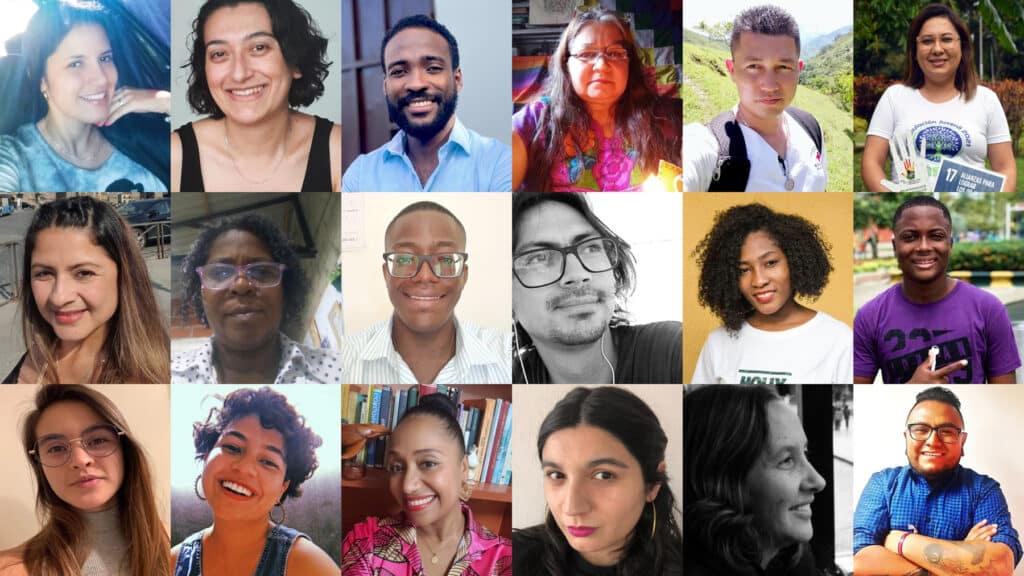
Chicago Peace Fellows Mutual Aid Collaborative hosted a Civic Partner Series conversation with University of Chicago Medicine Violence Recovery Team to learn about a unique public health model of violence interruption. And Global Fellow from Detroit, David Metler, provides insights into Swingset Activism and the idea of social justice education inspired by childhood. He proposes that we have much to learn from children who can help us integrate our activism into our lives and embrace the elements of playfulness, joyfulness, loving-kindness, presence, creativity, and our capacity to re-imagine what is possible.
August
The Chicago Peace Fellows Mutual Aid Collaborative this month carried out two activities. They launched the Safety + Cycling Team to tackle violence which occurs during road and traffic accidents, by providing bike helmets and safety tips at community events.
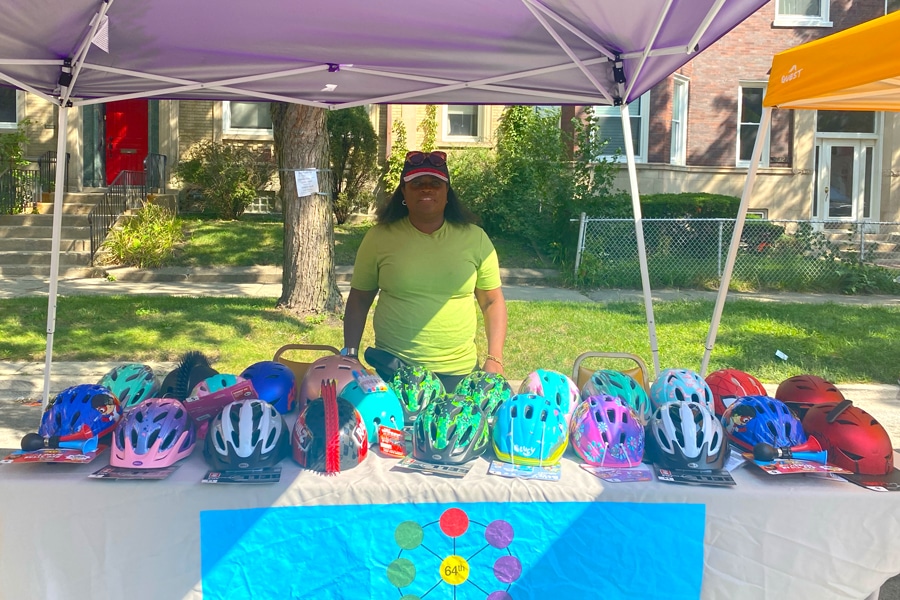
The Mutual Aid Collaborative also hosted a conversation with Dr. Andrew Papachristos to build connections and learn how the science of social networks can be used to understand and target support to people at the highest risk of becoming a victim of gun violence.
2019 Chicago Peace Fellow, Pastor Robert Biekman, piloted a Community of Practice utilizing the GATHER Platform to foster peer-to-peer learning amongst newly ordained pastors with the Evangelical Lutheran Church of America (ELCA). And Global Fellow from Argentina Diana Rocio Gomez Torres, explored the emergence of social movements across South America and bring visibility to the history and memory of these strategies of practical and symbolic resistance.
September
In September, our Fellows around the world embarked on several peacebuilding projects in honor of International Day of Peace 2022. These activities included: The launch of an apprenticeship program for Children Born of War in Uganda, using soccer to promote peace and reconciliation in Colombia, creating a new generation of youth leaders working on peacebuilding in Israel, Freestyling for social change in Colombia, and Peace Day activities from three Global Fellows in South America.
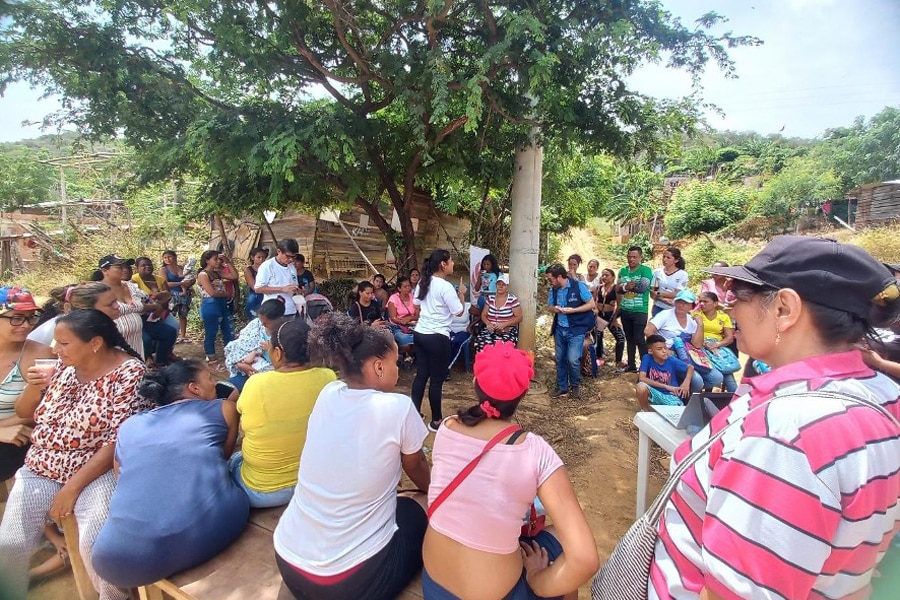
This month we also saw the graduation of the 2022 Chicago Peace Fellows! After embarking on a five-month learning and sharing journey together, their achievements were celebrated at the Chicago History Museum.
October
This month the Goldin Institute turned 20! For the past two decades the Goldin Institute has adopted an approach which is grassroots-led and embedded in kindness, compassion and learning, from everyone but most especially those closest to the issues. We promote the voices of those excluded voices who often have the most at stake in making progress and ensure that they have leadership roles in every social change movement. Which is why it is extremely exciting to celebrate 20 years of the Goldin Institute.
The Chicago Peace Fellows Mutual Aid Collaborative also launched Generation NOW, an idea conceived by Messiah Equiano, a 2021 Chicago Peace Fellow, which will provide opportunities for young people to write and produce a teen talk show addressing everyday issues that teenagers face. We also celebrated the Chicago Day of the Girl with Chicago Peace Fellow La’Keisha Gray-Sewell’s organization (Girls Like Me, Inc) hosting an event to both celebrate Black girls in the city and ensure their sense of belonging.
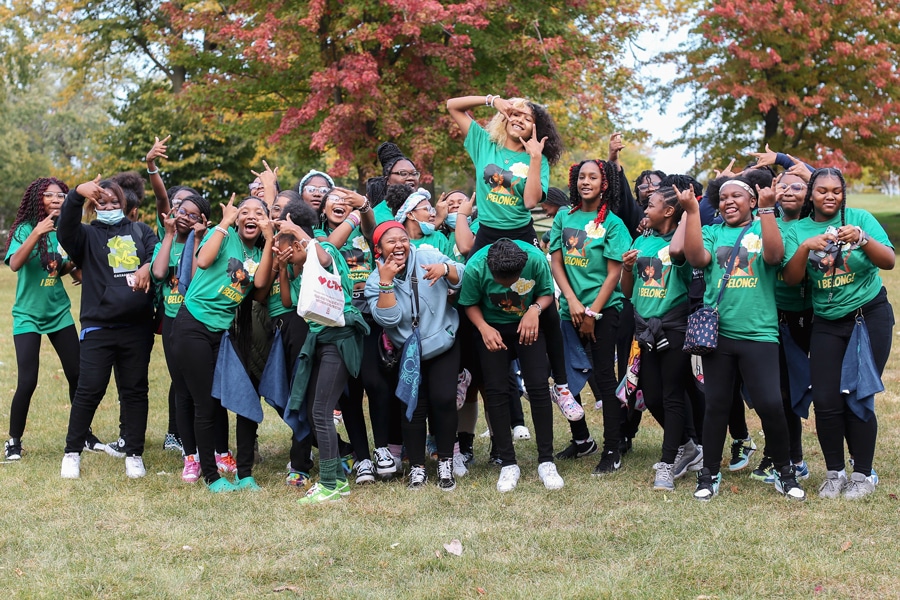
The first annual Sukkah Design Festival was also held this month, on October 9-16, showcasing North Lawndale’s Jewish history and providing social services to the community. Reshorna Fitzpatrick, 2019 Chicago Peace Fellow and Executive Pastor of the Stone Temple Baptist Church, was a member of the organizing committee, which included both community-based organizations and design firms.
November
Our 2022 Global Fellows (English-language cohort) graduated from the Gather program! At the graduation ceremony on 4th November, the 2022 Fellows demonstrated their achievements and shared their aspirations, recognizing how much stronger they now are together.
Global Fellow Oluchi Uzodimma from Nigeria also provided an update on the devastating impact of the recent flooding in Nigeria which has displaced more than 2 million people and damaged over 200,000 homes.
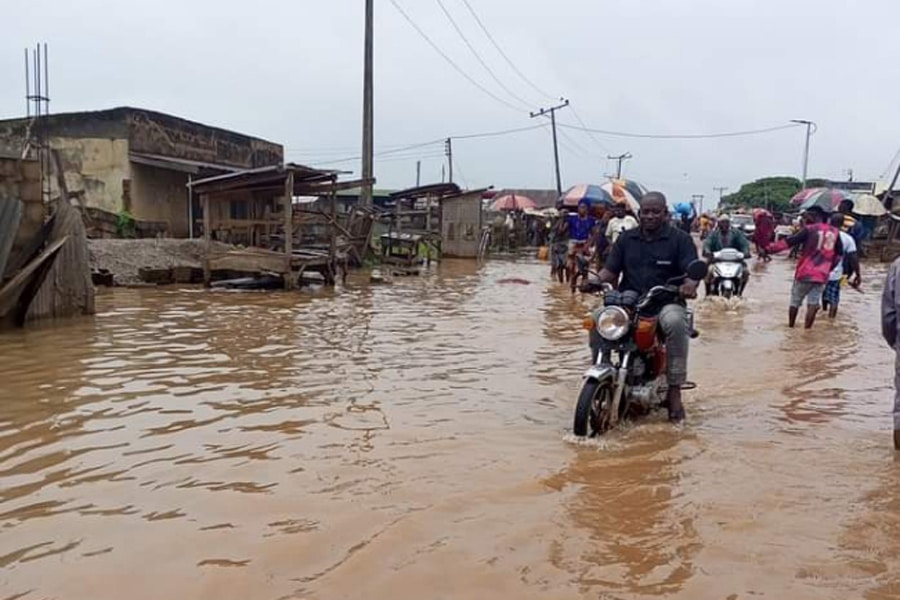
December
As we wind down to conclude the year, we were honoured to celebrate the achievements of the first Spanish-speaking cohort at their graduation ceremony on December 10th. The ceremony included performances in the form of song, freestyling, music, and poetry and reflected on what the Fellows had achieved, individually and collectively.
We remain humbled and honoured by the achievements of our global network of Fellows and we have much to be thankful for, especially the support of our global network of friends and colleagues. We would like to give a special thanks to all our sponsors and supporters for ensuring our leaders were able to continue their much-needed activities throughout the year.
Celebrating the 2022 Chicago Peace Fellows Graduation
By Jamika Smith, Tina Gulley-Augustus, Don Williams, Jacqueline Williams, and Cree Noble
On September 29th, 2022, 14 grassroots leaders from across Chicago gathered at the Chicago History Museum to celebrate their achievements as the fourth cohort to graduate in the Chicago Peace Fellows program.
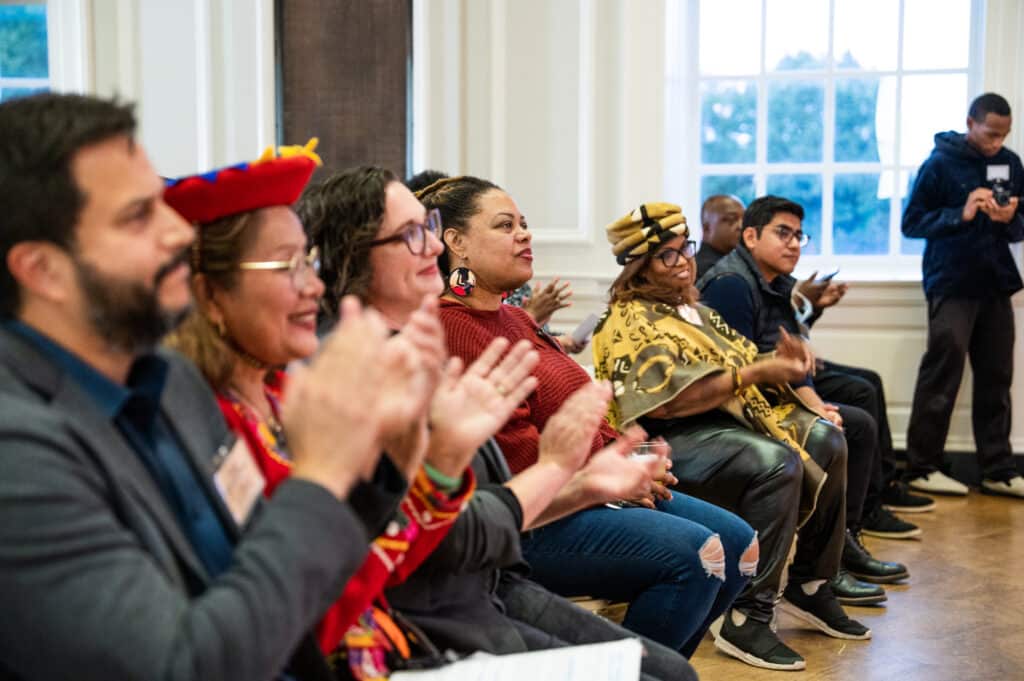
The Chicago Peace Fellows (CPF) program spanned over six months with over 25 workshops, partnership meetings, and discussions that helped Peace Fellows to deepen their shared understanding of grassroots leadership, violence prevention and community driven social change.
“Some of the greatest learning experiences were the collaboration of the Peace Fellows in developing community asset maps and recognizing how rich our communities look when we viewed them from an asset standpoint instead of a deficit. Our communities are so rich in knowledge, resources, and talents.” -- Tina Gulley Augustus, 2022 Chicago Peace Fellow
This was the second year that the Chicago Peace Fellows Graduation was hosted at the Chicago History Museum. The space was filled with laughter, cocktails, hors d'oeuvres, and music by a performance from a youth band from Segundo Ruiz Belvis Cultural Center playing Caribbean Jazz. The balcony gallery, just before you enter the great hall, was lined with pictures of the 2022 Peace Fellows. The gallery is named after the late Mrs. Josephine Baskin Minow, a community organizer, and advocate, who fought for many years for social justice and equal rights, to improve the quality of life for others much like the Chicago Peace Fellows.
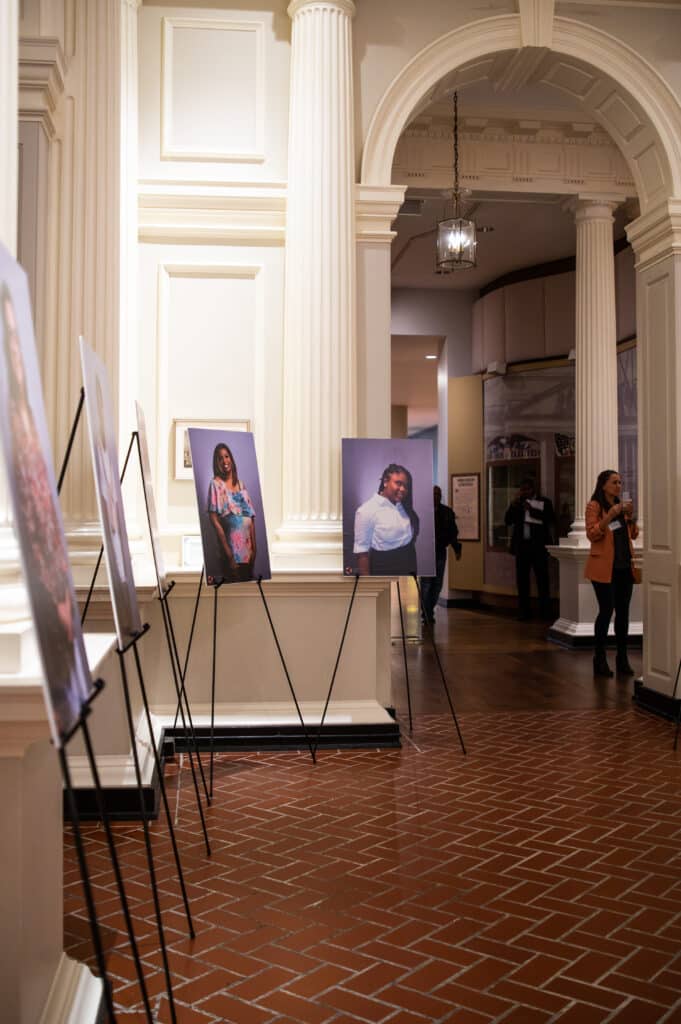
The graduation program was created by the Fellows to highlight their experiences, learnings and accomplishments. They incorporated personal testimonies, group facilitation, spoken word, asset mapping, and interactive programs into the design of the agenda. These activities were chosen due to the influence they had on each Fellow and how they allowed us to connect to our communities, family, and friends who were all in attendance at the graduation ceremony.
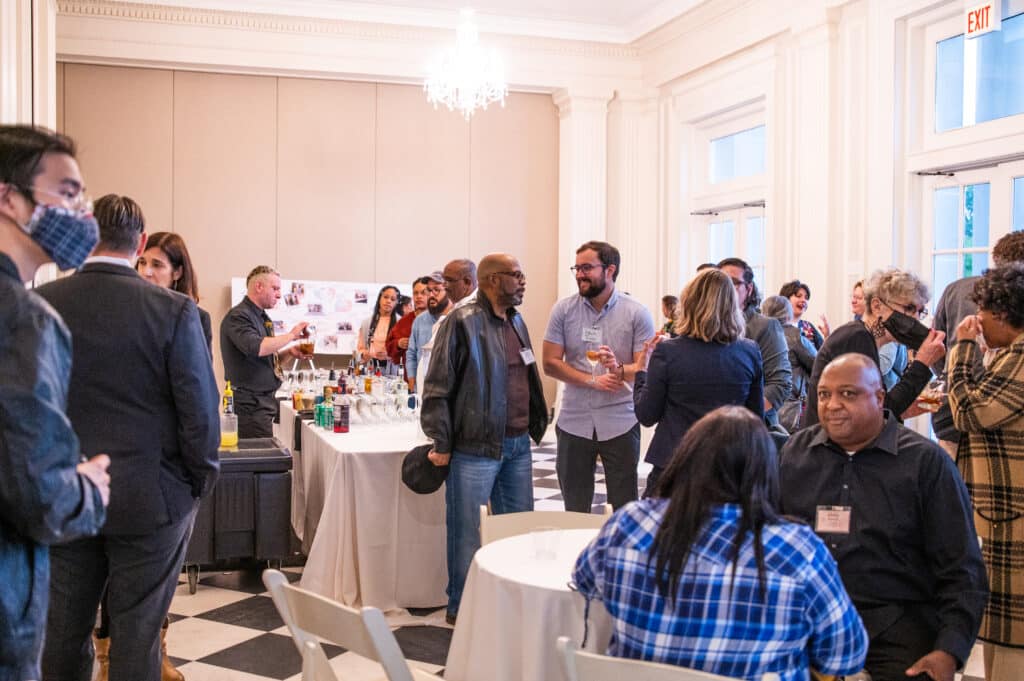
The ceremony began with a welcome remark from the Director of the Chicago Peace Fellows, Burrell Poe, who spoke about the impressive effort, work and conversations this group of fourteen leaders had undertaken over the past five months. Following Burrell, Fellow Lindsey Joyce opened the space with a prayer and reflection. After this opening reflection, Chicago poet Brynn Baltimore offered a powerful spoken word piece performance. The fourth speaker was CPF Don Williams, who provided a personal testimony about the loss of his son and how he had turned pain into purpose.
“My tribute to my son Deon J. Williams left me with a lot of mixed emotions about March 9, 2019… getting up there speaking about it brings some comfort and steps of me getting some closure. Deon was my baby. I wish things would have been different that day and that he would still be here. But that is why I started the Deon J. Williams Foundation, so that I could bring some awareness to juvenile law to change. I want to give a special thanks to my newfound family, the Peace Fellows. Thanks for allowing me to share my story. I hope I can impact someone.” - Don Williams (2022 Chicago Peace Fellows)
After Don’s powerful testimony, all 2022 CPF joined on stage to introduce themselves and the community they serve, and answer the question: “If violence disappeared tomorrow, what would be possible in my neighborhood?”, group presentation which was led by 2022 CPF Syliva Del Raso. Once the Fellows had shared their answers, they invited the audience to contribute to the question by writing it on a sticky note and placing it on a poster board.
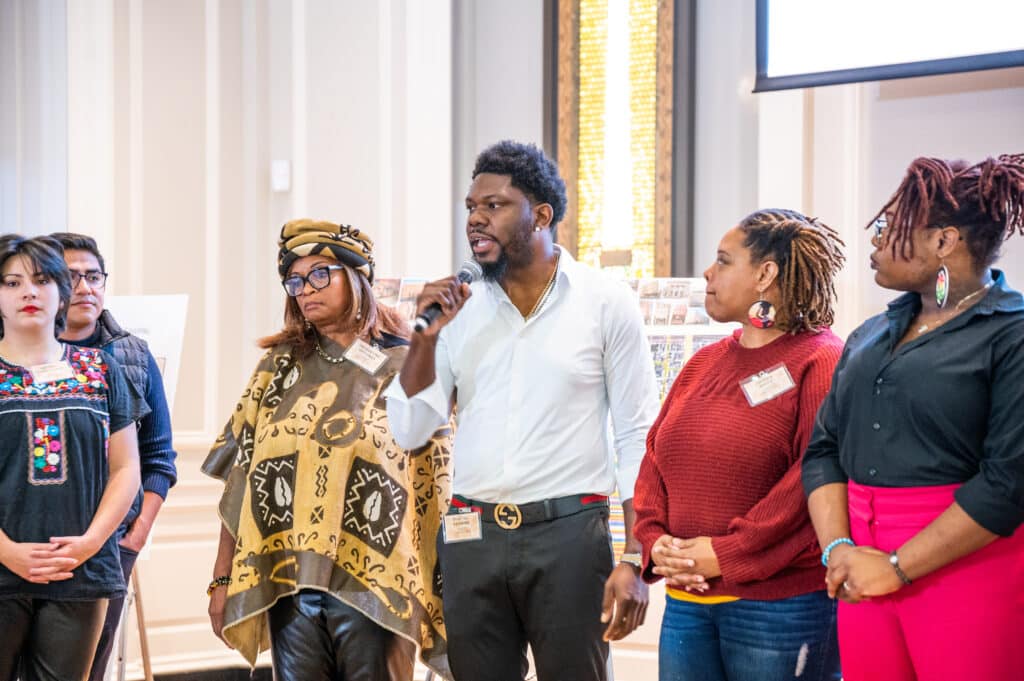
The second part of the ceremony was an explanation and presentation of what asset maps were. Fellows presenting their asset maps included Maria Pike (representing Pilsen), Edwin Martinez, and Sylvia Del Raso (representing Little Village), and Jackie Williams, Jamika Smith, Xochtil Hubbell-Fox, and Tina Gulley-Augustus (representing Austin).
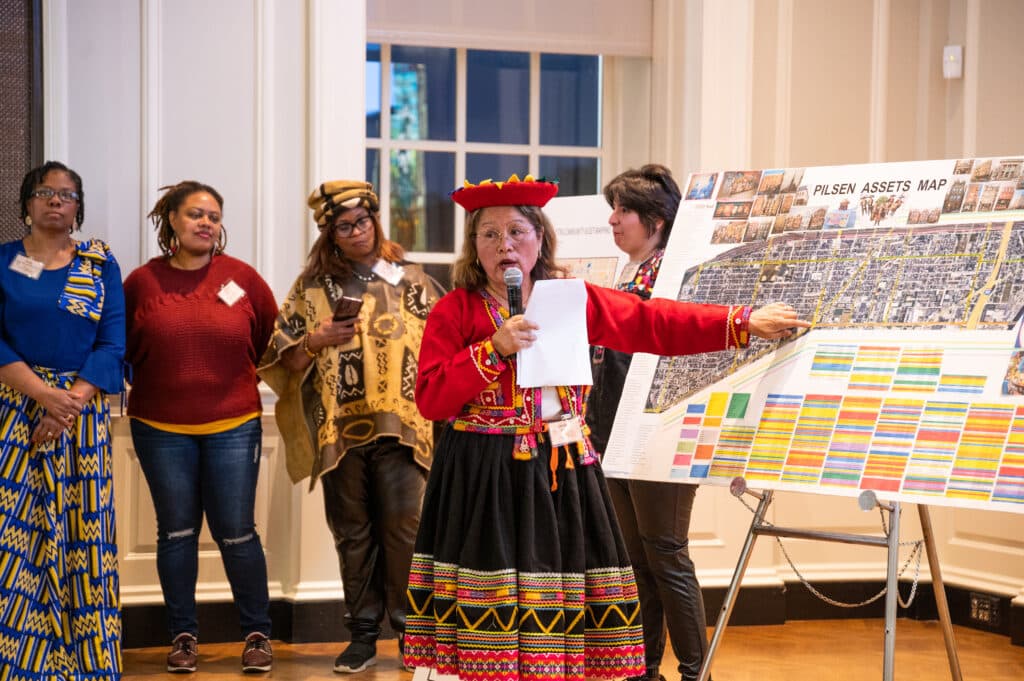
Then CPF Pha’Tal Perkins and CPF Edwin Martinez made closing reflections on what they hope to accomplish as they put their new learnings into practice. Lastly, Jamika Smith unveiled a project she wanted to gift to the 2022 Chicago Peace Fellows.
"Because I gained so much from the overall experience, my Spirit moved me to return the favor by sharing with my cohort and the Goldin Institute leadership a little piece of my heart. I took a skilled craft that has been around since the Middle Ages and I metaphorized it -- did I just make up a word? My cohort and I took an old worn-out chair and told our story, addressing the question “If violence disappeared tomorrow, what would be possible in my neighborhood?” One by one, we discussed the challenges, barriers, and limited beliefs our neighborhoods are struggling with today. Next, I asked them to share with me, if violence was rid from our communities tomorrow how would you feel? And what image and color will represent that feeling for you? After gathering all 18 responses I incorporated them into a design that represented the voices of our 2022 Chicago Peace Fellows. Our Peace Chair will always be an attribute of our journey together. My goal is to take our peace chair on tour in 2023, giving each Peace Fellow the opportunity to house it for a period of time in their organization, as a reminder that we are all connected and still have work to do…Together!” - Jamika Smith (2022 Chicago Peace Fellow).
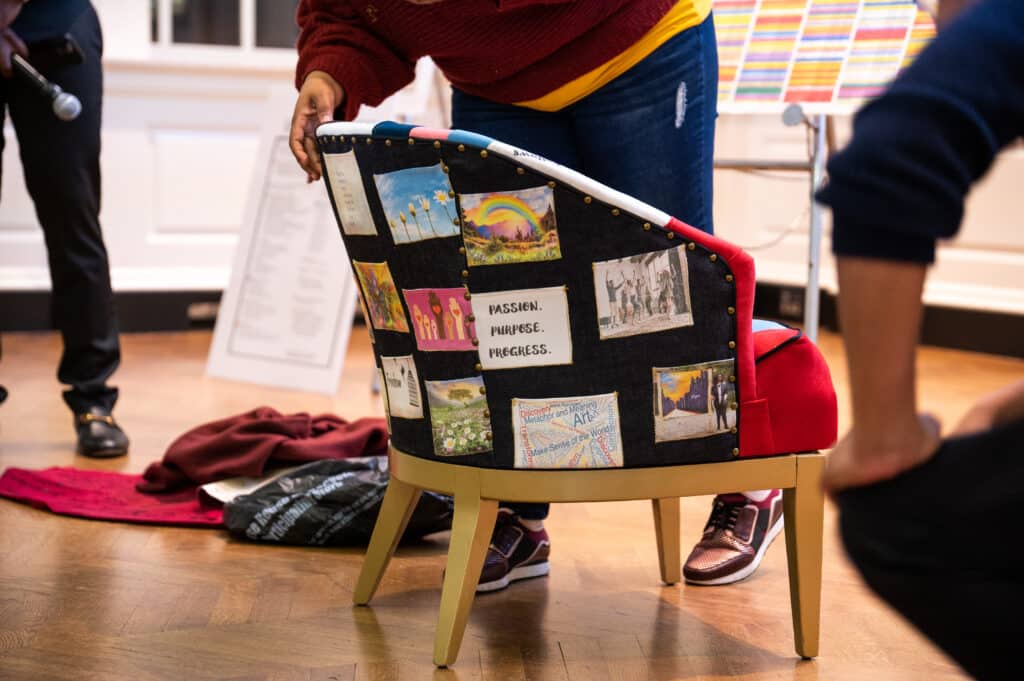
Upon graduation, the 2022 Chicago Peace Fellows now join the Goldin Institute’s Global Alumni Network which consists of over 150 Fellows from over 40 countries around the world. 2022 Chicago Peace Fellows Jacqueline Williams says “I plan to continue to stay in touch with as many people as possible. I have really enjoyed talking and connecting with everyone!
A December To Remember: Mutual Aid Collaborative Organizes a Toy Drive
By Michael Henderson, Director, Mutual Aid Collaborative
Juliet Jones, a 2021 Chicago Peace Fellow Alumni and the Co-Founder and Director of The Original Sixty Fourth Street Drummers, Inc. “wanted to bring children back to play” due to the set back and effects COVID-19 had on kids during the holidays. She thought holding a toy drive to benefit children in under-served communities would be a good way of accomplishing this goal.
Juliet, passionate about making a difference for children, proposed The Universal Toy Drive to the Chicago Peace Fellows Mutual Aid Collaborative. The Mutual Aid Collaborative consists of 60 Black and Brown leaders and committed allies who live and work in the communities they serve on the South and West sides. They have raised over $100,000 to support several active projects, including The Universal Toy Drive.
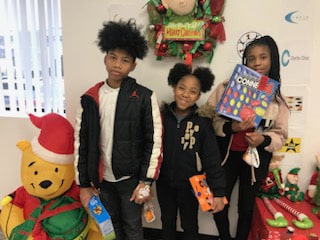
Juliet organized the Universal Toy Drive along with Dr. White, the TEECH Foundation, Clarity Clinic and Bethany Union Church to bring toys to disadvantaged children on the Southside of Chicago. Members from The Mutual Aid Collaborative, including Cosette Nazon-Wilburn of the LUV Institute, Jamila Trimuel of Ladies of Virtue, Gloria Smith of the Black Star Project, and Margaret Murphy-Webb of the Southside Jazz Coalition, all came together as a community to support Juliet. These leaders organized quickly by sharing flyers, sending and processing invitations, and reaching out to their network of parents.
On December 21, 2022, the Universal Toy Drive became a safe space for 113 children to play and receive gifts. The Universal Toy Drive was more than just giving toys away. Juliet knew the children who would be at the toy drive “normally missed out on a lot of things, not just toys, toys were the medium.” It was the intent of Juliet and the Mutual Aid Collaborative to bring joy to the lives of the under-served children and provide them with an opportunity to be kids.
Juliet was overwhelmed with joy as she got an opportunity to witness a village of children from a variety of places. Families who are dealing with HIV, children from the foster care system, children whose parents are incarcerated or in recovery, and other children from the community received all sorts of different toys, gift cards, coats, and other bags of goodies.
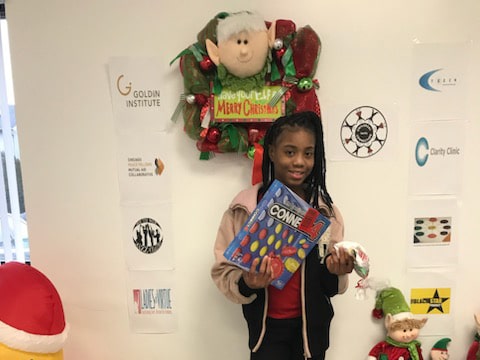
The 113 guests with their families that attended The Universal Toy Drive played board and video games, watched YouTube videos, played hopscotch and jump rope. They drank apple cider, hot chocolate, ate cookies and took pictures with Santa. The energy in the room was so amazing and filled with joy that the children received their gifts but, “didn't leave, they stayed and played, it was great”.
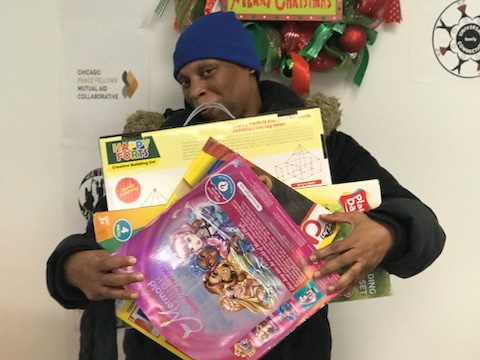
The collaborative efforts to touch the lives of children went beyond the imagination of Juliet’s and the village of local leaders. The Universal Toy Drive was a great success, providing 113 children with toys and gifting additional toys to The Universal Family Connection to use in their playroom for foster children. Juliet is ready for 2023 and has plans to continue to collaborate and organize with other community organizations to hold another Universal Toy Drive.
Generation Now Helps Teens Produce New Talk Show
By Zeki Salah, Facilitator, Mutual Aid Collaborative
The Chicago Peace Fellows Mutual Aid Collaborative is introducing teenagers to work in the media industry through a project called Generation NOW. Generation NOW was conceived by Messiah Equiano, a 2021 Chicago Peace Fellow, and aims to provide opportunities for young people to work on a teen talk show that addresses everyday issues that teenagers face. The program pays teenagers to produce, direct, and act in the show and provides them with a safe environment to express their thoughts.
Messiah originally thought of the idea of a teen talk show in 2014 and pitched the idea to the television station WCIU. The project was initially based on a show that appeared on BET in the 90s and early 2000s called Teen Summit. Teen Summit provided a platform for teenagers to talk about the everyday issues they face and brought these issues into perspective within an open and safe environment. Messiah thought the idea of a teen talk show was valuable and conceptualized Generation NOW as a similar program that would also allow the young people to get involved in aspects of production.
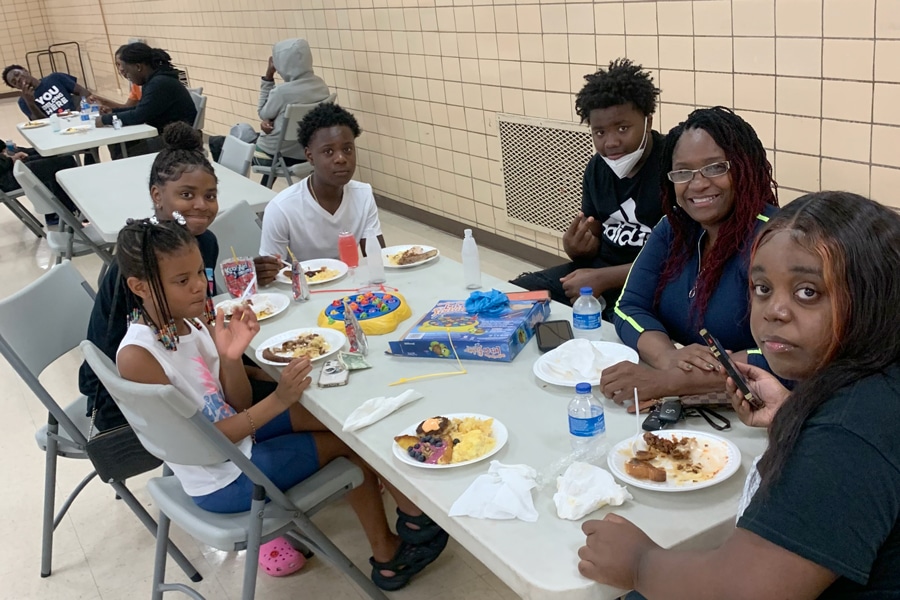
While the station turned down the pitch, Messiah persisted and applied for a grant from the Chicago Community trust to shoot a pilot episode of Generation NOW. He received the grant from the Chicago Community Trust in 2019 and filmed the pilot at Lawndale Community Academy. This experience showed him how therapeutic and empowering a platform for teens to express their issues could be. Since then, he has been working to secure funding to film more episodes of Generation NOW, including the August 5 filming that was funded by the Mutual Aid Collaborative.
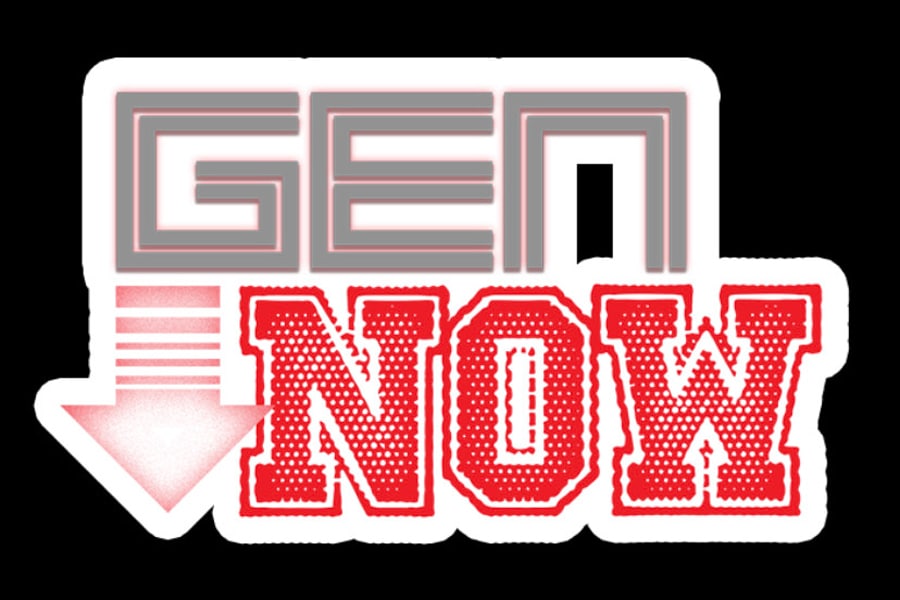
The Mutual Aid Collaborative is made up of 60 Black and Brown leaders and committed allies who live and work in the communities they serve on the South and West sides. They have raised over $86,000 to support several active projects, including Generation NOW. The Mutual Aid Collaborative met and collaboratively voted in May to provide Generation NOW with the funding to film another episode at the Foster Park District.
Generation NOW aims to provide young people with a setting to be open about their opinions, while also providing them with experience with different aspects of television production. Teens are invited to work on the project as writers, production members, or actors and are compensated for their work. On August 5th, the funds provided by the Mutual Aid Collaborative were used to pay 10 teenagers $250 each for their involvement in a day of filming. Funds were also used to provide them with meals and entertainment and also paid for a camera crew. Generation NOW aimed to provide the teens involved with a new opportunity to express themselves without judgment.
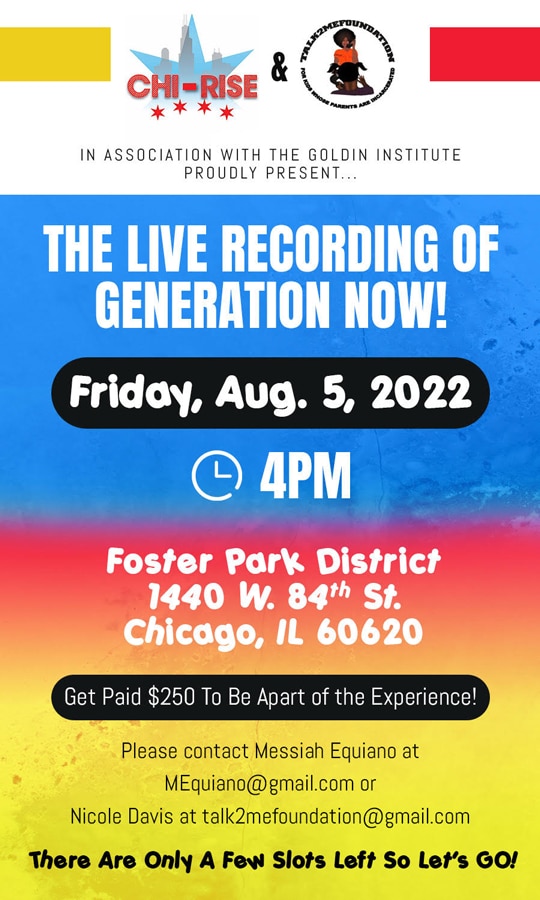
The young people were not only provided with food and time to get to know each other, but they were also told not to laugh at each other or dismiss opinions and were assured that the raw footage from the filming would not become publicly available.
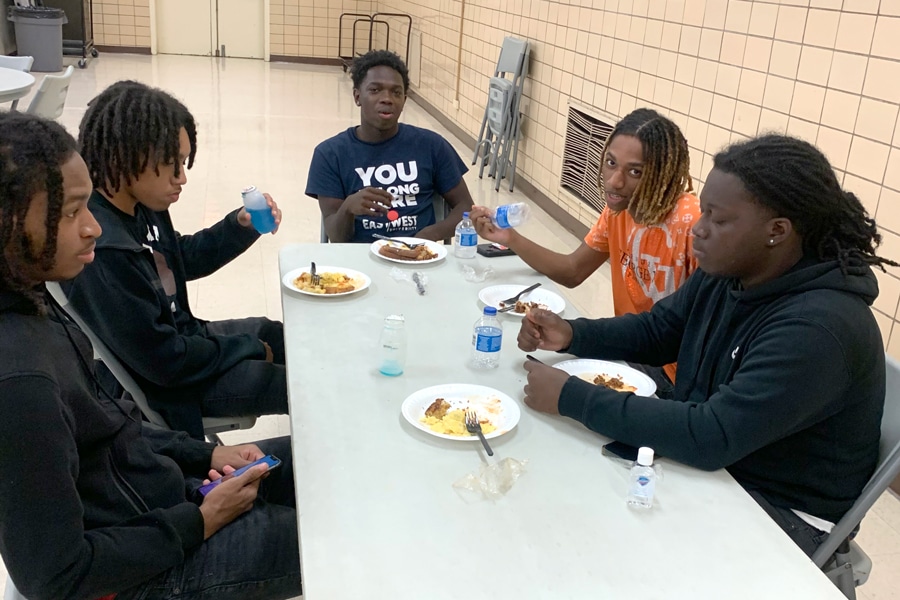
The filming of Generation NOW on August 5 was a collaborative effort between Peace Fellows. Alongside Messiah, Nicole Davis and the Talk to Me Foundation brought in actors and rehearsed together. As part of the filming, Nicole and her teens performed a skit where a woman accuses a man of stealing her purse, he denies stealing her purse, and she comes back with her brother to confront the accused man. At the end of the skit, someone approaches the woman and informs her that she left her purse in the bathroom and she apologizes. This scene was modeled after the experiences of the teens themselves, who gave input on how the scene might unfold.
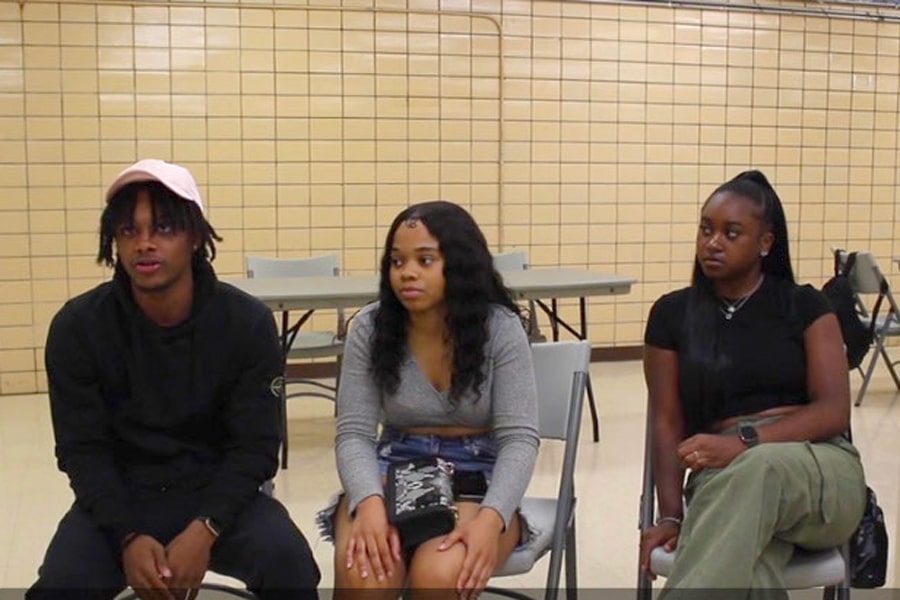
While Nicole led the rehearsal, the script of the conflict and resolution was developed by the teens. For instance, when asked what they would do if confronted about stealing, all of the young men at the filming responded that they would stand their ground during the confrontation and would not run away. The filming not only provided the teens involved with a platform to voice their beliefs without judgment, but also with a chance to enact their visions in a production and to work together collaboratively.
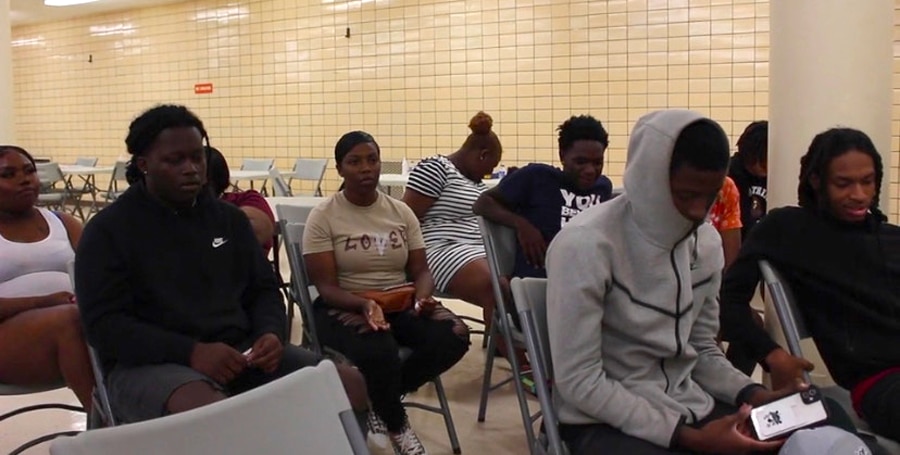
The response of the young people involved in Generation NOW has shown that the program is both therapeutic and empowering. Messiah spoke to the experience of the teens involved as they were provided with a platform to speak about topics like dating and conflict resolution: “Human beings hold onto so much in their hearts and their minds related to their experiences... Even if someone doesn’t express themself, just hearing another person make themselves available can make them feel better.” By continuing to provide this platform for teens and compensating them for their involvement, Messiah believes he can first them away from activities that might lead to violence:
[Generation NOW is about] getting a gun from someone’s hand and a camera into it. I’ve seen this in real life, I’ve seen people love it... you put a camera in his hand and he loves it. You’ve got to give them alternatives and have them get paid for it.”
Messiah’s organization, CHI-RISE, is looking for funding to continue to produce episodes of Generation NOW. They are also looking towards expanding the programs to different communities, and looking specifically at communities with higher risks of violence. Through community collaboration, they are hoping to help teenagers find work on the project during summer and winter recesses from school. Ultimately Messiah hopes to create a sustainable model for Generation NOW by getting members of the community involved and having them watch the show. Through creating content that gives back, Generation NOW aims to create safer and more connected communities.
